business@tribunemedia.net
‘Serious discomfort’: Superwash expansion hit by $1m VAT reform
By NEIL HARTNELL Tribune Business Editor
SUPERWASH’S principal says plans to create 25 jobs by building a new laundromat location have been given “serious discomfort” by legal reforms restricting his ability to reclaim VAT on construction expenses.
Dionisio D’Aguilar, also a former minister of tourism and aviation, told Tribune Business he finds it “most disconcerting” that changes to the VAT Actwhich accompanied the 2025-2026
• Plans for new laundromat to create 25 jobs
• But bar on reclaiming VAT is ‘disconcerting’
• New bureaucracy, ‘one person’s whim’ fear
Budget - now prevent “legitimate businesses” such as his from reclaiming the 10 percent levy paid on construction inputs, such as building materials, if the project costs exceed $1m.
Revealing that he is “about to launch into a construction project” designed to expand Superwash’s New Providence network by one
By NEIL HARTNELL
AN Abaco fatherand-son duo say they are “disheartened” that the Government has shown little to no interest in supporting their proposed $500,000 investment to expand egg production nine-fold. Christopher and Dexter Sawyer, of Sawyer Family Farms, contrasted their treatment - and the allegedly silent response to their three-year outreach effort - with this newspaper’s revelations that Andros-based Blue Hole Farms is set to acquire 130 Crown Land acres for its
location, he added that the extra costs and uncertainties created by the Government’s VAT policy change have produced “so many unknowns” that Bahamian companies will likely be deterred from growing their plant’s physical presence.
In particular, Mr D’Aguilar warned that the move will likely
• $500k spend to expand egg production nine-fold
• Contrast Gov’t silence with Abaco project reply
• Minister: Gov’t working to give help via BAIC
own $18m egg production facility that it is negotiating with the Government. However, Jomo Campbell, minister of agriculture and marine resources, contradicted the Sawyers by telling this newspaper that the Government had spoken to them the week before last. He added that it was working to provide assistance to them via the
urged: ‘Get into 21st century’ on
By NEIL HARTNELL
FAMILY
Island hotels enjoyed a 9 percent increase in room revenue for the 2025 first half as the industry was urged to “get into the 21st century” on bookings and sales distribution.
Kerry Fountain, the Bahama Out Promotion Board’s executive director, told Tribune Business that - with room nights sold by member hotels that were open during the same period in 2024 also ahead by 5 percent for the six months to endJune 2025 - the sector could be satisfied with its performance as it seeks to drive annual occupancy rates up from the average 45 percent.
“If you look at room nights sold for all our member hotels, we’re up about 5 percent compared to the January through June period last year,” he told this newspaper. “We’re looking at about 53,325 room nights sold through January to June 2025 compared to 50,883 last year January through June. That’s about a 5 percent increase.
“If you look at room revenues, they increased at a higher pace. Room revenues were up maybe about 9 percent this year, January through June compared to January through June last year.” Breaking down Family Island hotel performance by island, Mr Fountain said Cat Island was up year-over-year by 8 percent on room nights sold, while Abaco, Acklins, Bimini,
Bahamas Agricultural and Industrial Corporation (BAIC), and an announcement is likely to be forthcoming in the next two to three weeks.
Dexter Sawyer, though, told this newspaper that unless he was “doing some serious sleepwalking” he and his father had “definitely not spoken” to Mr Campbell despite efforts
create “another level of bureaucracy” that frustrates and delays local firms given that they can seemingly apply to the VAT comptroller for an exemption from the prohibition on obtaining refunds on their construction inputs.
Questioning how the exemption application process will work in practice, and if companies will have to submit requests for this on a monthly basis, he added that the reforms leave companies “so beholden to the whim” of the person making this decision - in this case, Shunda Strachan, also
to arrange a meeting with the minister and Ministry of Agriculture and Marine Resources officials directly and via intermediaries.
He added that his last contact with the ministry was via the secretary for its permanent secretary around three months ago in a failed bid to arrange a meeting, and the duo had “not heard anything else”.
Dexter Sawyer said both himself and his father, and their US chick and equipment suppliers, require assurances from the Government on the “rules” they must comply with before they move forward. Arguing that they had shown Bahamas-based egg production can succeed, having supplied Maxwells and other Abaco food stores with eggs laid by their former 650-strong chick flock, the duo told this newspaper they have the necessary financing and supply chains in place
Fisheries chief sounds alarm over revived poaching activity
By ANNELIA NIXON Tribune Business Reporter anixon@tribunemedia.net
THE National Fisheries Asso-
ciation’s (NFA) president is raising the alarm that signs of poaching have been detected in the southern Bahamas just as the annual crawfish season starts.
Keith Carroll told Tribune Business he is extremely concerned that the Dominican poachers, who the NFA, the Bahamas Commercial Fishers Alliance (BCFA) and the Royal Bahamas Defence Force have battled for years, are starting to return. Following a long-running fight to bring the problem under control, he added: “It’s heading back the same way that it was 15, 20 years ago.”
While praising the Royal Bahamas Defence Force, the NFA president said he has received reports from fishermen that signs indicating the presence of poachers are being found in the southern Bahamas.
“When you spear a lobster, some of the legs may drop off, the whips might break off, and they’ll be right under your trap or something,” Mr Carroll added. “There’s signs that crawfish were there, but somebody already went and got them. And you’ll see when they get them, they’ll ring them, they’ll take the tail
from the head and leave the head right there.
“The guys who have condos, the crawfish go underneath them. If somebody go there to spear them, they could see that crawfish was there and they could see that people already been there because the whips of the crawfish would be left behind, and all the legs would be break off and and all that.
“You can see when a lobster was in a spot and someone was there. You can see. It’s like leaving from home, and you leave your bed made-up, and you go home to see your bed rumble up. You know somebody been in your bed. It’s the same thing.”
Mr Carroll said poachers will always take advantage if the Royal Bahamas Defence Force does not patrol the country’s waters so frequently in the offseason. While the rise in US day trippers conducting illegal fishing activity, he added that “US boats usually border the northern Bahamas” while the reports he has received came from the south and “these are Dominicans”.
“When you really look at it, the boat is only smaller - like probably three and four guys on it,”
Mr Carroll said of US poaching.
“But then you have probably hundreds of them to compare
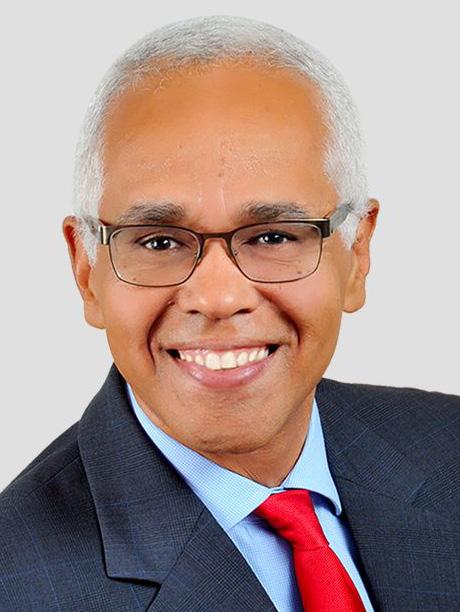
the Department of Inland Revenue’s
NHI funding and expansion must be ‘married together’
By NEIL HARTNELL Tribune Business Editor nhartnell@tribunemedia.net
NATIONAL Health Insurance (NHI) funding must be “expanded” to match the scheme’s benefits growth, the Medical Association of The Bahamas (MAB) president says, describing this as “open for discussion”.
Dr Nikechia Hall-Dennis, in a recent interview with Tribune Business, said the Association is continuing to call for both its members and all doctors providing services to the Government-run and managed healthcare scheme to be paid in full and on time. She acknowledged that the late payments by the NHI Authority are creating financial challenges for physicians.
“We are aware of it and have spoken to them about it,” Dr Hall-Dennis added of the payments. “They [the NHI Authority] are making their best efforts
to resolve the problem. It’s difficult because if most of your practice is seeing primarily NHI patients, then your income is coming from those patients.
“So the ability to pay your staff, your ability to pay the bills of your office, and provide the basics that NHI requires of the physicians, it’s difficult to meet them if you are not getting those payments. That creates a difficulty where physicians want to provide the best level of care but it is increasingly difficult for them to do so.
“As the payments are capitated, the volume of patients that you have doesn’t necessarily go along with the capitation of payments. There is a very fixed amount that you get from your patient population if they are predominantly NHI patients. You can continue to see patients regularly without getting any more funds, so if you’re not getting paid it’s difficult.”


Bahamian officials heading to China over SME management
THE Chinese ambassador has met with government officials set to travel to China for a seminar designed to boost growth among Bahamian small and medium-sized businesses.
Yan Jiarong saw Barry Griffin, chairman of the Bahamas Trade Commission; Randy Rolle, chairman of the Consumer Protection Commission; and Dave Munroe, acting managing director of The Bahamas Development Bank (BDB), on Friday ahead of their trip to the ‘Seminar on small and medium-sized enterprises (SMEs) management for The Bahamas’.
The ambassador and Peng Jing, commercial attaché at the Chinese embassy in The Bahamas, also held exchanges on economic and trade co-operation, SME management and capacity building with the trio.
Ms Jiarong outlined China’s path to modernisation,
the Global Development Initiative(GDI) and China’s policies and practices in SME development, e-commerce and consumer protection. She emphasised that SMEs, which connect millions of households, are a vital force in driving innovation, creating jobs and improving livelihoods.
The seminar, which is designed to align with The Bahamas’ needs and priorities, will allow participants to learn more about China’s successful SME development, have direct interaction with Chinese SMEs, and further benefit both nations and their peoples.
The three Bahamian government representatives shared their expectations for the upcoming visit to China, raising questions and co-operation proposals that require in-depth discussions with their Chinese counterparts. Three seminars are planned in China this year.

In addition to the seminar on SME management, the other two involved an ‘Agricultural by-products production strategy for The Bahamas’, which was held in June, and the upcoming ‘Seminar on tourism management for The Bahamas’ that is set to take place in September. Each seminar hosts 23 participants, and all expenses - including international travel, and costs in China - are covered by the Chinese government. The SME management seminar will take place from August 5 to 18.. Key topics include: Best practices in promoting international co-operation for SMEs; Laws and regulations for SME development and
protection; SME support service systems; Innovation capacity building for SMEs; SME leadership and corporate culture; and development models and trends in cross-border e-commerce for SMEs.
The programme combines lectures, interactive exchanges and market research. Participants will conduct field visits to Wenzhou, Zhejiang province, which is one of China’s most dynamic regions for SME development. It is hoped that this exchange of knowledge and mutual learning will foster stronger SME collaboration and shared development between the two countries.
BTC IN ‘TARGETED ACTION’ OVER CUSTOMER FEEDBACK
THE Bahamas Telecommunications Company’s (BTC) top executive says the carrier has “responded with targeted action” to customer concerns and what their biggest needs are.
“We listened. And, more importantly, we acted,” said Mr Bhatti. “‘You said it, we did it’ is more than a slogan — it’s a commitment. Our customers spoke clearly about what matters most to them, and we’ve responded with targeted action across the board. We’re building trust, one action at a time. Because when our customers speak, we listen — and we deliver.”
BTC said it has strengthened and improved its mobile network nationwide, ensuring faster, more reliable service for
Sameer Bhatti, BTC’s chief executive, said in a statement that the company has invested in improving the speed and reliability of its mobile network in response to subscriber feedback as part of its ‘You said it, we did it’ initiative. This is focused on improvements that impact customer experiences, and aligns with BTC’s revived ‘Vibes’ campaign.
customers. It added that it will soon unveil two further upgrades in Grand Bahama and Bimini.
The carrier has also launched a suite of tips and digital tools to help customers get the most out of their services, ranging from managing mobile data to understanding bills and reducing wait times. Key innovations include the ‘Happy or not’ digital system which allows customers to give instant feedback on their in-store experience.
The MyBTC mobile app has undergone several customer driven updates,
the latest of which allows Bahamians to view their call, SMS and data usage in real time. BTC said this is focused on creating quicker, more efficient and more satisfying customer interactions.
“We’re equipping our customers with knowledge, so their experience becomes smoother, faster and more empowering,” said Mr Bhatti. BTC said it is also continuing to strengthen its community ties through the expansion of two key initiatives - the Silver Blue Connection programme and the Mo Love Loyalty campaign.
BTC introduced the Silver Blue Connection programme in 2024. It is designed to offer a personalised experience for senior citizens, the differently abled, and residents of far-flung Family Islands. The carrier added that this is a tailored initiative for the most vulnerable, offering ‘CX Concierge’ services and an enhanced in-store experience.
‘Mo Love’, BTC’s loyalty programme introduced earlier this year, aims to recognise and incentivise customers. The carrier has hosted loyalty events in several communities, the

SAMEER BHATTI
most recent held on Saturday, July 24, at Stapledon School.
“You said it, we did it’ aims to shift how BTC does business. The carrier added that, by turning feedback into progress, BTC is not just listening to its customers but evolving with them.

GOV’T ‘CAN’T JUST TAX’ FOR NHI’S FINANCING
By ANNELIA NIXON Tribune Business
THE Government “can’t just tax” to finance National Health Insurance (NHI), a businessman is arguing, but must instead consult the private sector and tackle the wellness crisis via more creative means.
Ethan Quant, Lifestyles
Digital Media Group’s founder and chief executive, said he does not “have a general problem with the overall concept of employers contributing to NHI” after Dr Michael Darville, minister of health and wellness, last week confirmed that legislation debated in the House of Assembly paves the way for companies and the self-employed to pay contributions to fund the scheme.
However, he asked what incentives and concessions will be offered to ease the financial burden of running a business if entrepreneurs
were asked to pay another new tax, fee or levy. “Case in point; all of my equipment that I got to bring in, I’m paying 35, 40, 50 percent duty,” Mr Quant added.
“I got a cost on things to build out my studio. So there are other costs that I have to pay just for being an employer. So what can we do on that front?” Mr Quant, who previously ran an employee wellness consultancy that Lifestyle Digital Media Group was born from, is married to fitness personality Dekel Quant [Bowflex Barbie]. He was also a consultant under the previous administration for the Ministry of Health and Wellness, where he aided a threemonth pilot initiative for the National Wellness Programme. “So, I’m very familiar with this,” Mr Quant added. “Which is why I can tell you: I think you can’t just tax.
“You can’t just say ‘Okay, well, we’re running out
of money. We don’t have enough money to fund the programme so we’re just going to tax the people who are actually trying to move the country forward’.
“Small businesses in every other first world economy drive the economy of the nation. And so you have entrepreneurs, and instead of just taxing them, which is going to put a burden on the economy, you aren’t doing anything to address the actual problem. Why do we have such a heavy burden on the health care system?” he asked.
“And so my thing is that you are just trying to go for the easy pickings and just just hit the people that you quote, unquote think could afford it. But you’ve got all these fast food restaurants coming in, you’ve got the soda companies coming in, you’ve got all these things and there isn’t a tax on that.”
A health and wellness component is currently incorporated in the
employee programme at Lifestyles Digital Media Group. Mr Quant believes healthier employees provide better performance in the workplace, adding: “It’s ingrained into our culture.” He questioned what incentives would be provided for employers who already include health and wellness as a priority within their business.
Mr Quant said obesity must also be tackled as opposed to simply taxing employers. He spoke at a recent event that sought to promote the idea children should drink more water, adding: “When you go to a beverage station that they had servicing the actual event, there was no water there. They had juice and soda.
“This is the reality because you’re saying one thing but, at the event where you’re addressing the issue, and one of the issues you’re saying is that we want to make it healthier for our kids, and our kids should drink more water, you actually don’t have water to be served at the actual event.”
Mr Quant voiced hope that using employers to help fund NHI would be put out to public consultation first, giving the private sector a chance to provide feedback.
“I would really hope that the Government, before they roll this thing out, they really have a serious dialogue with the private sector, even if it’s through the Bahamas Chamber of Commerce, so that we could actually have an opportunity to speak,” Mr Quant said.
“The reason there’s such a burden on the healthcare system is because we’re generally, as Bahamians, an unhealthy population. Just taxing the employers isn’t going to make The Bahamas a healthier place. So what other measures does the Government want to put in place to address the overarching problem?
Long-term boating fee impact ‘yet to be seen’
By FAY SIMMONS Tribune Business Reporter
AN ABACO resort and marina owner says said the long-term impact from the new and increased boating industry fees “remains to be seen”.
Molly McIntosh, the Bluff House Beach Resort and Marina’s proprietor, said the impact of the increased cruising permit fees, as well as the new anchorage and fishing permit fees, has yet to be fully felt as many summer visitors booked their trips
prior to the 2025-2026 Budget’s implementation.
Speaking to Tribune Business, Ms McIntosh said she agrees that Bahamian marinas are doing “very well”, as pointed out by financial secretary, Simon Wilson, last week. But concerns remain over the industry’s continued success due to the changes. “He’s correct in that our marina did very, very well this year. But, of course, the fees came into effect July 1. Most people had already made their plans, and were already over here, so I’m not really sure how it’s going to affect us
going forward,” said Ms McIntosh.
“In July, when it came out, people had already made their plans. They weren’t going to stop and change plans. Now, when they go to plan for their next summer vacation, are they going to skip us because they feel that they were cheated or mistreated or not appreciated? Is that going to change their plans for next summer? What is it going to do to the slow season?
“Most of the people in the summer are the wealthier, bigger boats. It remains to be seen what


effect it’s going to have for the rest of the year and for next year.” Ms McIntosh said that while the industry understands the reasons for increasing fees, they could have been implemented over time so visitors would not be deterred from visiting the destination.
Highlighting the new anchorage fee, she explained that many boaters are “pretty irate” about
paying a fee to anchor when they are docking at a marina. “We understand that the fees have to go up, but the way it was implemented could have been done in a better fashion, maybe more slowly,” said Ms McIntosh. “I think it will affect our business. We’ve had a couple cancellations, and when the people call they’re usually pretty irate
“And then also have a third party really make this thing a true public-private partnership (PPP). Engage people in the wellness space who aren’t within the Government . We get a lot of professionals at the wellness space who are doing a lot of great things, Bowflex Barbie, my wife, included, who are like years ahead of everything else that the Government is doing.
“She has an app that anybody can access, that you can get nutrition information, you can track your food. And that’s Bahamian. I have no problem helping out, but I really think that just taxing employers on NHI is not going to reduce the burden of NHI,” he added.
“What’s going to reduce the burden of the cost of NHI and the Government is to help the country get healthier. How do we do that? You do that by engaging other stakeholders on how we can make ourselves healthy as a country.”
if they’re cancelling because of the fees. It seems like the anchorage fee seems to make everybody the maddest that I’ve been talking to.
“They’re like, ‘I’m not anchoring. I’m staying in the marina, why am I paying an anchorage fee?’ And it’s been made really clear that everybody’s going to pay that anchorage fee. I don’t think there’s any way getting around that but there’s ways to do things where you don’t get

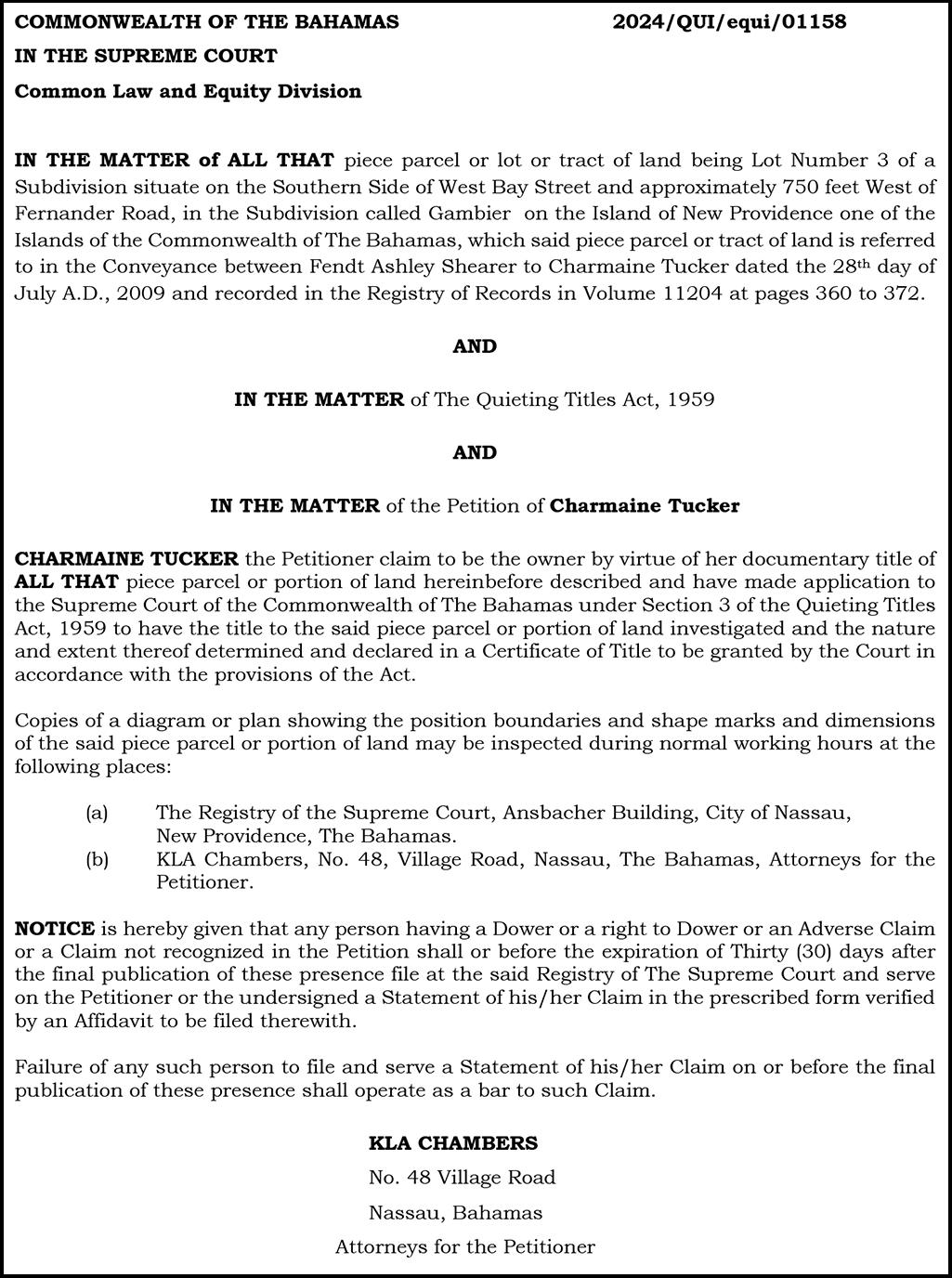
Prices still uncertain as crawfish season opens
CRAWFISH - from page B1
with the Dominican boats which would probably have say about 25 men on them. But the boats that come from Florida, there’s so much of them. I mean, all them do the same amount of damage if you look at it.”
Emphasising that he is not taking any political side, Mr Carroll said he understood that under the Davis administration citizenship has been granted to more Dominicans. “They have eyes on our banks now,” Mr Carroll added. “We heard about poachers out there. People saw some boats out
there during the summer. They saw them. But like, I say, they’ve slowed down a lot.
“The last year of the FNM administration, that’s when they cracked down on these Dominicans. That’s when it really slowed down. But when the new government came and started giving these permits, and now they’re giving more and more...
fishing boats get out there you might not see as much of them coming now to fish because we out there now. You’ll have more than just the Defence Force out there.
This fishing is a gamble. You just invest and you really don’t have no control of what the price could be. And you don’t know what the price could be until the boats come in.”
“You’d probably have 80 Bahamian fishing boats out there. They know if we see them, we gone call the Defence Force. So you might not see none of them. None of them might come again until next summer.”
Mr Carroll said the only solution he sees moving forward is a policy that states only persons born in The Bahamas can work in the fishing industry. When asked if this surge in poachers will impact crawfish season, he added: “It’s still a long way off.”
“The season just opened. These guys [Dominicans], usually when the season opens back up, and all the
“I don’t have a problem with a Bahamian woman falling in love with a Dominican. If they fall in love like normal people, you court, you be together for a while, you get married, and this the kind of work he is do to support his family. I don’t have a problem with that. But when you come in the country, get married for convenience and doing this, I have a problem with it.”

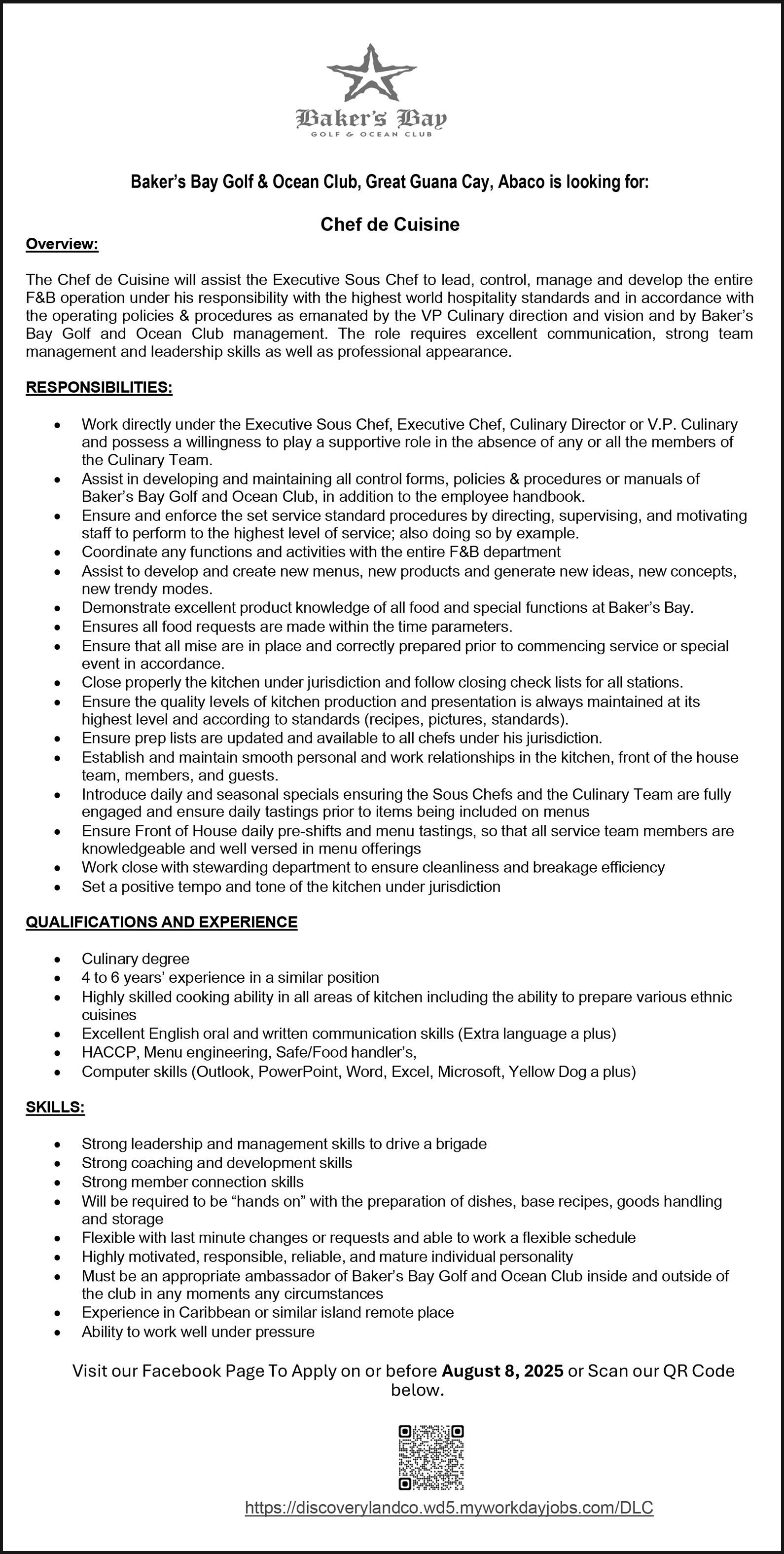
As for the financial prospects this crawfish season, Mr Carroll said: “When it come to the price, we don’t know if the price going to be $20 when the boats come in, we don’t know if it gone be $2. We don’t know this.
Noting that the average crawfish price typically begins between $10 and $11 per pound, Mr Carroll said that when bigger boats come in, it usually settles around $12 or $12.50 per pound. Andrew Thompson, captain of a commercial boat, said his belief is that 2025’s profits will be average due to stiff competition from the African market.
“You can make a profit out of it but, you ain’t going to make what you made
last year because it going to start off low,” Mr Thompson said. “Probably just $10 per pound. Probably because the African market opened back up, too. They sell so cheap, so our prices drop very low.
“It’s going to be average. It ain’t going to be nothing too off-scale like last season. Last season was alright, pretty good, even if the gas price was high. It was a little better. The season ended with almost $19 a pound. So it was pretty good. It started off with $12 and then, in March, it was like $18, $19 from November straight down. So it was pretty good.”
Utilities must meet topend visitor expectations
SERVICE - from page B1
Eleuthera and Long Island were also ahead.
Andros was said to be flat, while Exuma was “significantly down”. However, Mr Fountain said the start of Bahamasair’s direct airlift to Exuma from Fort Lauderdale at the end of June should start to turn the island’s performance around.
Room revenues for the 2025 first half showed similar trends where Abaco, Acklins, Eleuthera, Long Island and San Salvador were ahead of 2024 numbers, Cat Island and Andros were flat, and Exuma down.
“That’s the lay of the land,” Mr Fountain said. “In general we’re pleased, but we know we need to do some homework between now and the end of the year to salvage the service we lost when Silver Airways went bankrupt.”
The Promotion Board chief, meanwhile, told Tribune Business that “the onus” is now on Family Island hotels to use “the right” third-party tour operators and travel agents to drive bookings to their properties and break average annual occupancy rates
that are traditionally below 50 percent.
“If you look historically at the average annual occupancy of Family Island hotels, it’s usually around 45 percent,” Mr Fountain said. “That tells me, OK, while the Ministry of Tourism and Bahama Out Island Promotion Board are trying to improve airlift, access and affordability, the onus now is on our hotels to improve their sales distribution mechanism.
“It cannot be that out hotels just rely 100 percent on direct bookings. They have to now start working with the right tour operators and wholesalers, start to work with the right online travel agents and work with travel agents selling The Bahamas.
“We understand when working with these sales distribution outlets that you have to pay a commission. But the objective is to use third party distributors to increase your first-time visitors and, once they get to your hotel and enjoy the experience, the hotels need to figure out a way to capture their e-mail address and contacts to market to them directly in the future,” Mr Fountain added.
“We have to start to use these third party distributors to bring in first-time business. It’s going to cost a bit of money, but it’s just one time. That’s the acquisition cost to get first-time customers. Now, if we do what we need to do at our end, that’s a customer you will keep for life, market to them directly and capture them.
“It’s a two-way street. We need our hotels... some are doing it a bit, but not all, to get into the 21st century in terms of sales distribution.” Mr Fountain added that The Bahamas is also poised, as a high-end destination, to benefit from travel trends benefiting the so-called “luxury” market provided this nation ensures “we deliver the value and experience that luxury travellers expect”.
This, he added, requires The Bahamas to focus on workforce development and ensuring that utilities such as Bahamas Power & Light (BPL), the Bahamas Telecommunications Company (BTC) and Cable Bahamas provide electricity, Internet and communications on a reliable and consistent basis.

NHI payments static as cost of living grows 30%
DOCTOR - from page B1
Doctors who provide services to NHI, speaking on condition of anonymity, said they received another payment for June in late July, meaning that the scheme is around a month behind in paying them for services rendered.
One said that doctors serving NHI are paid $12.50 per patient per month - a fixed-rate capitation payment that has not altered in eight years. “That hasn’t changed since 2017, but the cost of living has gone up by 30 percent in that time and they are not paying us any more,” they said.
“I’m a self-employed person and I have people to pay and the utilities and other things businesses have to pay. It’s a complete shambles as far as I’m concerned. They paid us 30 percent of June on July 3, then they paid us 35 percent. There should be another 35 percent to come.”
Another doctor confirmed: “They’re a month behind. This is nothing new. This has been going on for six months at least. How the average physician copes with it frankly I don’t know.
There are physicians where 90 percent of their practice is NHI patients.
“If they cannot pay for what they are offering now, how can they pay for anything more? We have staff to pay, we have bills to pay, we have significant overhead costs and it’s not taken into consideration by their payments and we have no communication other than to say we’re not paying you by the way.
“That’s their [the Government’s] unfortunate operational procedure. Unfortunately, that’s the way the Government operates. I think there’s this apathy created among the general populace that the Government pays its bills when it wants to pay, but you and I, the taxpayer, when we miss VAT returns and Business Licence, they charge us a penalty? Why is the Government being charged for not paying?
What’s good for the public is good for everyone.”
Dr Hall-Dennis, meanwhile, said the Association is in constant contact with the NHI Authority to advocate for “fair treatment” for its members and healthcare professionals who provide services to NHI when it
comes to the need for infull and timely payments.
And, speaking before last week’s House of Assembly debate on the NHI Bill, which paves the way for the Government to levy contributions from Bahamian employers and the self-employed to finance the scheme, she added that wide-ranging discussions need to be held on “marrying together” the expansion of healthcare benefits and care with the requirement for increased funding.
Warning that the two cannot be divorced, Dr Hall-Dennis told this newspaper: “That’s really open for discussion how we are, going forward, to provide funds to adequately finance and sustain NHI. Healthcare, in and of itself, is an expensive thing and there’s a limited amount of funds that can be necessarily be provided by the Government.
“There may have to be some debate on the way funds are generated for healthcare, and that is really going to have to be addressed at some point. Costs do tend to go up, and the more NHI provides for beneficiaries, the more costs will increase.”
‘We’ve never taken salary so can prove farm concept’
to expand to 6,000 chicks in the first phase and scale up both numbers and production according to market demand.
This first phase, they added, is designed to yield a more than nine-fold increase in egg production from the previous 3,600 per week to 34,000. Dexter Sawyer said Nassau-based merchants and food retailers, who he declined to name, have already voiced an interest in purchasing from them if they can supply a quality product in consistent volumes.
Challenging the Government’s lack of support, especially given its Golden Yolk initiative and desire to become self-sufficient in egg production, Christopher Sawyer told this newspaper: “We’ve been trying so hard with zero results from the Government.
“It took us quite a while to get up and running, and get people to accept locallygrown-eggs. As soon as we figured out all the rough spots and got ready to expand, there was no help from the Government.” Dexter Sawyer said they started out in mid-2022 with their 650-strong “test flock” - before the Government unveiled the Golden Yolk initiative - to show local egg production is feasible and there was demand.
He added that they first reached out to the
Government via John Pinder, the MP for south and central Abaco, who “vouched” for them to then-minister of agriculture, marine resources and local government, Clay Sweeting. However, the Sawyers are asserting that efforts to contact both him and now Mr Campbell, his successor, have proven fruitless.
Dexter Sawyer said all the duo are seeking is help “to get us on a bigger scale”, which would assist the Government’s objectives under the Golden Yolk initiative.
“A meeting for starters would be wonderful, just so we could sit down and talk about it,” he added.
Pointing out that farmers’ profits are measured in “pennies”, not dollars, especially when it comes to egg production, he added that he and his father are seeking ways to “ease the burden” on themselves given that they still have to pay VAT on all imported materials, equipment and animal feed.
“Trying to stay competitive against foreign eggs is incredibly difficult,” Dexter Sawyer said. “The farms over there turn out millions of chicks, so they can afford to sell eggs at far lower prices than we can.”
Christopher Sawyer added: “We want to expand, but we don’t know what the Government will let us do or not let us do. We don’t want to spend $500,000 and they come and shut us down.”
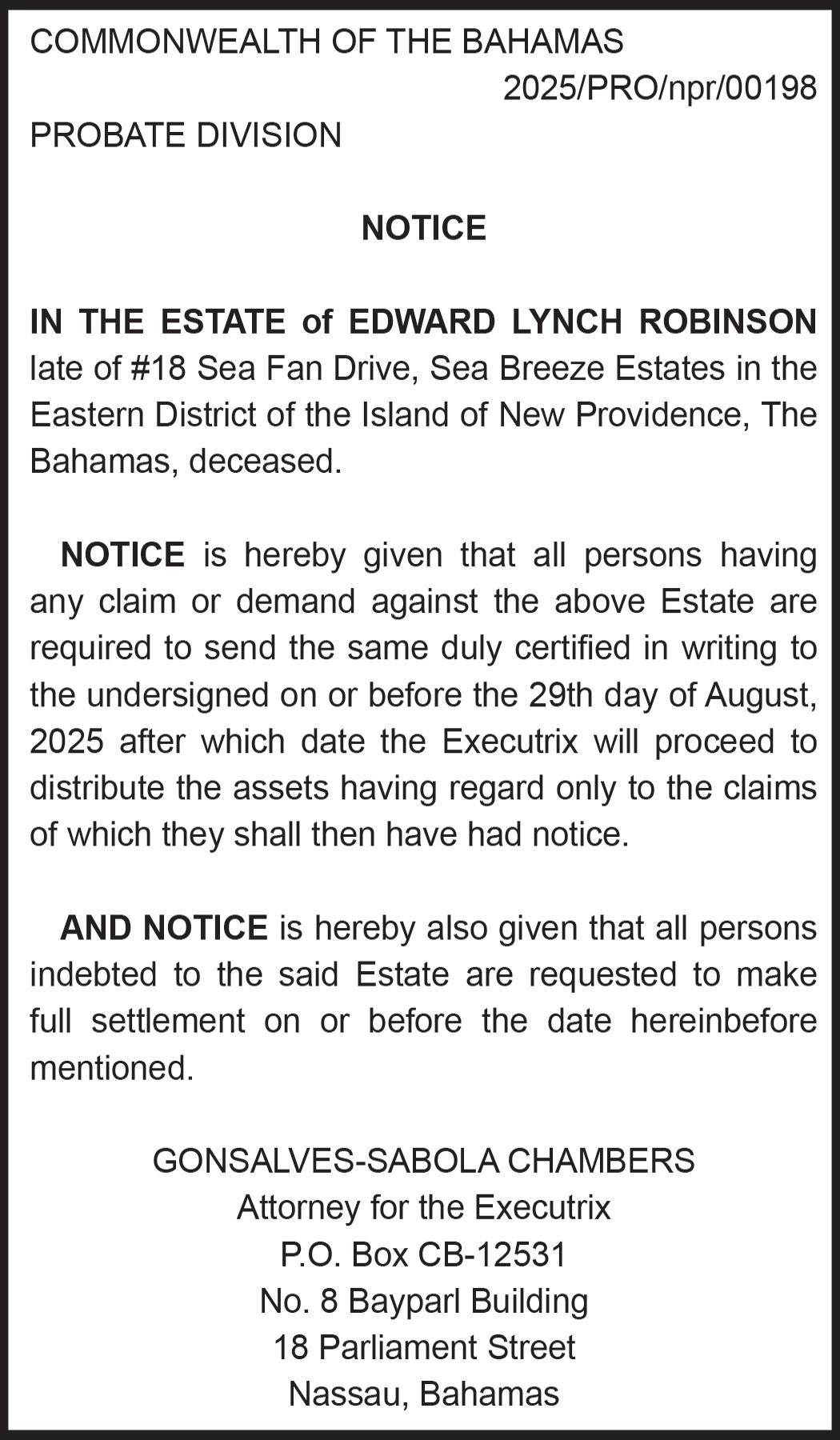
Dr Hall-Dennis said expanding NHI’s coverage and treatments “is a good thing” for Bahamians, as it will increasingly give them access to more affordable healthcare, “but the more things that are provided, the more costs are increased”. She added: “I think that if the scheme wants to be expanded then the funds have to be expanded. This has to be anticipated and that due process put into how these two things will be married together.”
Dr Michael Darville, minister of health and wellness, last week confirmed The Bahamas will “eventually have to pull the trigger” on employer and employee funding for NHI but it is “premature” to do so now.
He confirmed that the NHI Bill debated in the House of Assembly on Wednesday does “make way” for the healthcare scheme to adopt a model where it is financed by contributions from Bahamian employers, the self-employed and workers but such a move is “not on the table” at present.
Affirming that NHI will remain a government-funded scheme underwritten by Bahamian taxpayers for the foreseeable future, he added that multiple “preparatory steps” have to be implemented and completed before a scheme funded by business/employee
6,000 chicks in the second phase.
“When we had the full 650 going, we were doing 14,500 eggs a month,”
Dexter Sawyer added.
Further explaining why government support is so essential to Sawyer Family Farms moving forward, Dexter Sawyer said: “We actually have suppliers right now in the US wanting to get us started, but even they refuse to move forward until the Government gives us something in black and white.
“They want something in black and white before they sell us equipment. They’ve seen governments give projects the ‘thumbs up’ before only to later pull the rug from under them. Our concern is that we don’t want to invest this money and the Government comes and closes us down.”
Dexter Sawyer said they plan to expand to 6,000 egg-laying chicks in the project’s first phase, which would increase egg production from 3,600 per week when they had 650 chicks to 34,000 weekly. If successful, they would bring in another
“Since then, the Government has taken so long to deal with us that we had to kill off our flock because the chicks have a laying life of two years from when they start laying.
“After two years, the egg production drops off. The daily amount of food you’re putting in for the eggs is not worth it. We had to kill-off the flock.” He revealed that Sawyer Family Farms, located in south Abaco about one mile away from Abaco Big Bird, had even struggled to obtain a correct copy of the lease for its land from the Government.
Pledging to supply “as much as the market will take” if the expansion proceeds, Dexter Sawyer added: “We’ve been in touch with certain merchants from Nassau. I’m not at liberty to say who they are, but they’ve said that once we’re scaled up to give them a call.
“We’re not asking for the world. It’s just consistent


contributions can even be considered. These initiatives include upgrades to the existing public healthcare network’s infrastructure, the installation of new information technology (IT) systems and the time required for Bahamian private health insurers to adjust the pricing and content of existing medical policies and benefits packages to make way for the standard health benefit (SHB) introduced by the NHI Bill. The NHI Bill’s section 15 provides for the NHI Authority, the body that governs the plan, to use “monies payable by an employer of an insured person, or monies or allowances payable by a self-employed person for standard health benefits or other health benefits under this Act”.
Taxation, or some form of levy, imposed on employers and working Bahamians to finance NHI is far from a new idea. Who pays, and how much, have always been key issues ever since the scheme was first conceived by the initial Christie administration in the early 2000s. However, both employers and the selfemployed are unlikely to welcome any new and/or increased taxes - especially at this time.
Tribune Business reported at end-June that that the NHI Authority,
co-operation and the Government looking out for us as farmers. The price of foreign eggs is of great concern to us. We’ve done the best with shipping and VAT to be as competitive as possible. For a great number of months, our best-priced egg has been the same as their’s, and a great number are cheaper than the foreign eggs.”
Scaling the business up would allow the Sawyers to take on paid employees.
“At this 650 chickens, which is a lot to keep up with, at this size it wasn’t feasible to bring on other persons,” Dexter Sawyer added, “and pay them a reasonable wage.
“My father and I have never collected salaries from the farm. We put this
which oversees the statesponsored healthcare initiative that cares for more than 160,000 Bahamians, had again exhausted its annua; Budget allocation and was unable to pay sums owed to physicians and other service providers. Christy Butler, the NHI Authority’s managing director and chief executive, in a conciliatory letter acknowledging the impact the scheme’s financial challenges are having on its service providers, attributed the woes to the inability of its “static” $46.2m annual Budget allocation from the Government to keep up with ever-growing patient numbers, its expansion and rising costs.
The Davis administration expanded the NHI Authority’s annual funding by $2m in the Budget, increasing it from $46.2m to $48.2m for the 2025-2026 fiscal year - an amount projected to remain the same for the following two fiscal years. For 2024-2025, NHI had used up $36.135m - some 78.2 percent of its full-year $46.2m allocation - by endMarch, which marked the fiscal year’s three-quarter mark.
This suggested the remaining $10m was likely to be inadequate to see the NHI Authority through to the June 30 year-end.
effort in as proof of concept to see if Bahamians would like local eggs and if we can compete with foreign producers. We’ve never taken a salary from the business. Every time we expand there’s going to be more employees. The floor level for this to make any type of reasonable money to support employees and economies of scale is 6,000 chicks. That’s the low level.” Sawyer’s Family Farm’s expansion would take six to eight months to become fully operational from the time it is initiated, with equipment requiring an installation timeline of two months and a further six needed before chicks start laying eggs.

Full-time
Ex-minister: VAT exemption protocol must be ‘fleshed out’
for her to evaluate a company’s submissions and quickly determine whether the project costs and VAT figures she was being presented with are accurate.
As a result, he foresaw an entire “bureaucracy” being built to assess submissions while causing extra cost and delay for fir,s.
Asserting that “you’ve got to believe there’s a simpler way” to judge exemption requests, the former Cabinet minister suggested that firms “trusted” by the Department of Inland Revenue - and who have built up a history of tax compliance - should be allowed to present a break down of their construction project’s total costs. And, if there are any concerns or inconsistencies, the tax agency can carry out an audit;
“The thing I find most disconcerting is the requirement that if you construct a building, spend over $1m on a building, then the VAT you spend on anything you use for that building, you cannot deduct that unless you go and ask special permission from the VAT comptroller,” Mr D’Aguilar told Tribune Business
“How is that going to work?
“I’m just thinking of the mechanism. I’m about to launch into a construction project. We’re contemplating another location. We’re still in the planning stages, but will probably start in the latter part of the year.”
Mr D’Aguilar declined to identify the location of the proposed new Superwash laundromat, but added that it would take between 18-24 months to construct and create 25 full-time jobs at completion.
Tribune Business previously reported that the reforms cited by Mr D’Aguilar effectively amount to a new tax on business expansion that will also “shrink” construction activity in that area. And, by preventing Bahamian companies from recovering VAT paid on the building supplies purchased for expanding their physical premises, it turns the globally-established mechanism for how the tax works on its head.
VAT is ultimately to be fully paid by the end-user or consumer, with businesses allowed to offset the tax paid on their inputs against this sum. However, the curbs contained in the VAT (Amendment) (No.2) Act 2025 bar companies from recovering VAT on their legitimate expenses, thus in effect creating a “direct tax” on business expansion without saying so.
Resort and subdivision developers, or anyone constructing property for resale, is exempt from the Bill’s provisions and will be able to reclaim VAT on their inputs. The Government also appears to have selected the $1m threshold in a bid to ensure it does not impact middle class and lower income Bahamians. However, the Bill states that tax deductions on VAT inputs “shall not be allowed in respect of any goods or services acquired for use in, or connection with” property construction, reconstruction or renovations deemed to be a “major” project unless this is allowed by the VAT comptroller.
Apart from the $1m threshold, the Bill lists “major construction” criteria as involving dredging or land reclamation activities; the construction of docks, marinas and other waterfront structures; the building, paving and improvement of roads, driveways “or other access infrastructure”, and “any other construction activity as may be prescribed” by rules and regulations that have yet to be published. Mr D’Aguilar said much remains to be clarified over how this will all work in practice. This includes questions over whether Bahamian companies will be able to net off, or reclaim, VAT paid on their construction expenses against so-called ‘output’ VAT collected from consumers prior to hitting the $1m threshold.
And, after the $1m mark is passed, he queried whether companies will have to apply monthly to the VAT comptroller for exemptions from the restrictions. “That’s not exactly going to encourage construction,” Mr D’Aguilar argued.
“There’s 100 construction projects going on in this country every single day. Do you make the request every single month you file? It imposes a level of bureaucracy.”
The former Cabinet minister said that, while the Government has given no formal reason for introducing the construction-related VAT restriction, he understands it is designed to crack down on wealthy home owners who were using companies as “fronts” for multi-million residential projects to enable them to obtain VAT recoveries they are not entitled to. Endconsumers cannot reclaim VAT paid on inputs.
“I don’t know the extent to which this was being done,” he conceded. “But for those businesses that are legitimately carrying out expansion plans, I’m very interested in how the mechanism for this is going to work. They need to flesh it out more.
“Do I have to write every month to the VAT comptroller for an exemption? You have just 14 days to file, work it out, send the letter and get the exemption. It causes you to think: How is this going to work? Do I get a comfort level that they will grant the exemption? It seems to be at the whim of a civil servant.
“If they’re not going to give the exemption, do I want to do that project because there’s now an additional 10 percent in cost? Is this something where we should set up a much better structure, say you’re going to get an exemption for two months, three months? Are you minded to give preapprovals?” Mr D’Aguilar continued.
“If I’m going to build a new laundromat, and think it’s going to cost this, can I get pre-approved for that amount? How does the
person at the Department of Inland Revenue know what it should cost? This gives one a serious discomfort. Are they going to approve this? Do I have to apply every month? Are they going to say ‘no’? Are they going to delay and say nothing?
“It’s just additional bureaucracy for legitimate firms and companies that are legitimately engaged in expanding. I’ve got to believe that the additional bureaucracy is going to create an impediment for those companies that want to expand their business. There are so many unknowns, and you are so beholden to the whim of that person making that decision,” the Superwash chief added.
“You cannot write a piece of legislation that puts your business at the whim of one person. While Shunda Strachan is eminently reasonable, is it a good idea to hold up the expansion of a business or project that’s in motion, in the process of construction and, all of a sudden, once you pass this threshold that’s required for an exemption, the 10 percent VAT may be a substantial unforeseen cost.
“You’ve got to believe there’s a simpler way to do this. You have to write to the VAT comptroller and seek permission. She’s going to be inundated with these projects, and you’re not going to advance until you know the answer. She has to evaluate that the amount you are requesting, the cost of your project, are accurate and legitimate. I’m sure they are going to require an audit. It’s going to come.”
Mr D’Aguilar said developers and businesses are struggling to forecast how much construction projects will actually cost “because prices are changing every day”, especially with the ongoing uncertainties created by Donald Trump’s every-evolving tariff policies and trade battles. He added that he is still finalising the design for his new
Share your news
The Tribune wants to hear from people who are making news in their neighbourhoods. Perhaps you are raising funds for a good cause, campaigning for improvements in the area or have won an award. If so, call us on 322-1986 and share your story.

laundromat and has not “put it out to contract yet”.
However, with the Department of Inland Revenue also lacking the ability to determine whether the exemption application is correct, the Superwash chief said it will likely create “a huge burden” for the tax authority leading to the creation of an entirely new bureaucracy to handle it.
“This has not been thought through. They should rethink this completely. I can see it growing into a massive bureaucracy,” Mr D’Aguilar told Tribune Business. “This system requiring every single business to come to the Department of Inland Revenue is going to create such a blockage in the system and slow things down.
“I think this is going to come and bite them in the
back side. And when they figure out they have no way to assess whether a project’s numbers are right, they are going to create another layer of bureaucracy to review that before you come to them.
“They really don’t think these things through. It just seems to be bureaucracy piled on, and piled on, and piled on. They are designing systems to catch crooked businesses at the expense of honest businesses. I’ve got to believe there are more honest businesses than there are crooked businesses.”
As an alternative, Mr D’Aguilar suggested that companies who have earned the Department of Inland Revenue’s “trust” and proven themselves consistently tax compliant should not have to go through the $1m VAT exemption process. Instead, these firms
Fee increases needed More measured plan
EFFECT - from page B3
people’s feathers ruffled up quite so much.”
Ms McIntosh said increased fees are a necessary part of ensuring the environment is protected for future generations, and voiced hope that the funds generated will be used on sustainability initiatives and improving the equipment and staffing of water patrols throughout The Bahamas.
“I understand that part of the reason for the increases is to try and save our resources, and to not have quite the pull on our resources that we are seeing with the bigger numbers of people coming in. There are more people taking fish, lobster, conch. It’s harder on the sustainability of what is building and driving
our economy,” said Ms McIntosh
“Everything costs more now. The water has to be policed, either using drones, which costs more money, or having the Defence Force out there in larger numbers. That all costs money, and it has to be paid for somehow. And these fees will hopefully will help to make to upgrades to our systems and make things better.
“If we could see what was going to happen, and point that out to people and show it is being used... This is what was done in Abaco. This is what was done in Exuma. This is how they’re helping to educate people and enforce the regulations. But you don’t hear any that. They just say the fees are up and that’s it. If you don’t like it, go somewhere else.”

Dow leaps 585 points as US stocks recover most of Friday’s wipeout
By STAN CHOE AP Business Writer
THE S&P 500 jumped 1.3% in afternoon trading to claw back more than three quarters of Friday's drop. The Dow Jones Industrial Average was up 507 points, or 1.2%, with an hour remaining in trading, and the Nasdaq composite was 1.8% higher.
Idexx Laboratories helped lead the way and soared 26.9% after the seller of veterinary instruments and other health care products reported a stronger profit for the spring than analysts expected. It also raised its forecast for profit over the full year.
Tyson Foods likewise delivered a bigger-thanexpected profit for the latest quarter, and the company behind the Jimmy Dean and Hillshire Farms brands climbed 2.6%.
They helped offset a 3.7% drop for Berkshire Hathaway after Warren Buffett's company reported a drop in profit for its second quarter from a year earlier. The weakening was due in part to the falling value of its investment in Kraft Heinz.
The pressure is on U.S. companies to deliver bigger profits after their stock prices shot to record after record recently. The jump in stock prices from a low

point in April raised criticism that the broad market had become too expensive.
Stocks just sank to their worst week since May not so much on that criticism but on worries that Trump's tariffs may be hitting the U.S. economy following a longer wait than some economists had expected.
Job growth slowed sharply last month, and the unemployment rate worsened to 4.2%.
Trump reacted to the disappointing jobs numbers by firing the person in charge
of compiling them. He also continued his criticism of the Federal Reserve, which could lower interest rates in order to shoot adrenaline into the economy. The Fed has instead been keeping rates steady this year, in part because lower rates can send inflation higher, and Trump's tariffs may be set to increase prices for U.S. households.
Friday's stunningly weak jobs report did raise expectations on Wall Street that the Fed will cut interest rates at its next meeting in
September. That caused Treasury yields to slump in the bond market, and they slipped a bit more on Monday.
The yield on the 10-year Treasury eased to 4.19% from 4.23% late Friday.
The two-year yield, which moves more closely with expectations for Fed action, edged down to 3.67% from 3.69%.
"In our view, if the Fed starts to cut rates at its September meeting, we believe this would be supportive for markets," according to
ARGENTINA’S MILEI VETOES PENSION AND DISABILITY SPENDING INCREASES, CITING FISCAL DEFICIT PLEDGE
deficit before October’s midterm elections.
LIBERTARIAN Presi-
dent Javier Milei on
Monday vetoed an attempt to increase spending on pensions in Argentina and a law expanding protections for people with disabilities, saying the legislation would have undermined his flagship pledge to eliminate the country’s chronic fiscal
In publishing the veto decisions, Milei’s administration said that Congress last month passed the spending bills — meant to more fully compensate retirees for inflation and offer more financial benefits for people with disabilities — “without determining the source of the funds.” It said the bills “contradicted
NOTICE

NOTICE is hereby given that KELISHA ANNISHA GRAHAM of Taylor Street, Nassau Village, Nassau The Bahamas, is applying to the Minister responsible for Nationality and Citizenship, for registration/naturalization as a citizen of The Bahamas, and that any person who knows any reason why registration/ naturalization should not be granted, should send a written and signed statement of the facts within twentyeight days from the 28th day of July, 2025 to the Minister responsible for nationality and Citizenship, P.O. Box N-7147, Nassau, Bahamas.
NOTICE

NOTICE is hereby given that WILSON ISNORD of #13 Chenille Avenue, Garden Hills #2, Nassau, Bahamas is applying to the Minister responsible for Nationality and Citizenship, for registration/ naturalization as a citizen of The Bahamas, and that any person who knows any reason why registration/naturalization should not be granted, should send a written and signed statement of the facts within twentyeight days from the 29th day of July, 2025 to the Minister responsible for nationality and Citizenship, P.O. Box N-7147, Nassau, Bahamas.
NOTICE
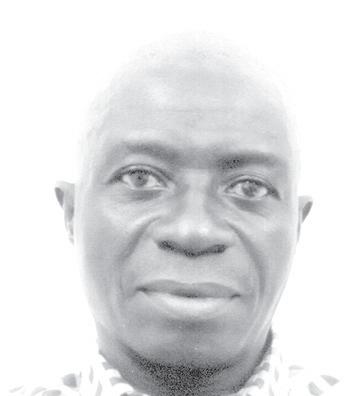
New Providence, Bahamas, is applying to the Minister responsible for Nationality and Citizenship, for registration/ naturalization as a citizen of The Bahamas, and that any person who knows any reason why registration/ naturalization should not be granted, should send a written and signed statement of the facts within twenty-eight days from the 28th day of July, 2025 to the Minister responsible for nationality and Citizenship, P.O. Box N-7147, Nassau, Bahamas.
(Milei’s) popular mandate” to bring down inflation.
Since coming to power in late 2023, Milei has vetoed all efforts to boost public spending, often wielding the slogan “there is no money” against people’s demands that he restore subsidies. The government projects that the additional expenditures, including a 7.2% pension increase, will amount to about 0.9% of gross domestic product this year and 1.68% next year.
“This president prefers to tell an uncomfortable truth rather than repeat comfortable lies: There is no money,” the government said. Spinning off the slogan of his ally, U.S. President Donald Trump, it added: “The only way to make Argentina great again is with effort and honesty, not the same old recipes.”
Last year Milei racked up Argentina’s first annual fiscal surplus in 14 years by making painful cuts to social spending and public works. The austerity measures helped drive down Argentina’s monthly inflation rate to below 2% in June for the first time in
five years, compared to more than 25% when Milei entered office in December 2023.
But the fiscal shock program has also deepened economic misery for many Argentines: Unemployment has climbed, wages adjusted for inflation have declined and prices are still up 40% year-on-year.
David Lefkowitz, head of US equities at UBS Global Wealth Management.
Such hopes, combined with profit reports from big U.S. companies that have largely come in better than expected, could help steady a U.S. stock market that may have been due for some turbulence. Before Friday, the S&P had gone more than a month without a daily swing of 1%, either up or down.
This upcoming week may feature fewer fireworks on Wall Street following last week's jobs report and profit updates from some of the U.S. stock market's most influential companies. This week's highlights will likely include earnings reports from The Walt Disney Co., McDonald's and Caterpillar, along with updates on U.S. business activity.
On Wall Street, Wayfair jumped 12.3% after the retailer of furniture and home decor said accelerating growth helped it make more in profit and revenue during the spring than analysts expected.
Tesla rose 2.3% after awarding CEO Elon Musk 96 million shares of restricted stock valued at approximately $29 billion. The move, coming six months after a judge ordered the company to revoke his massive pay package, could remove
Congress can still overturn these vetoes with a two-thirds majority in both chambers, a challenge for Milei’s libertarian party, which holds only a small minority of seats.
Milei, whose relationship with lawmakers has been tense ever since he took office, last year managed to win enough votes from his party’s closest ally, the conservative PRO bloc, to prevent the pension increases.
Milei is looking to Argentina’s crucial midterm elections in October to
potential worries that Musk may leave the company.
CommScope soared 88.6% after reaching a deal to sell its connectivity and cable business to Amphenol for $10.5 billion in cash. Amphenol rose 3.6%
American Eagle Outfitters jumped 23.3% after Trump weighed in on the debate surrounding the retailer's advertisements, which extol actor Sydney Sweeney's great jeans. Some critics thought the reference to the blondehaired and blue-eyed actor's "great genes" may be extolling a narrow set of beauty standards. "Go get 'em Sydney!" Trump said on his social media network.
On the losing side of Wall Street was On Semiconductor, which fell 13.6% after it only matched analysts' expectations for profit in the latest quarter. The company, which sells to the auto and industrial industries, said it's beginning to see "signs of stabilization" across its customers.
In stock markets abroad, indexes rose across much of Europe and Asia.
South Korea's Kospi rose 0.9%, and France's CAC 40 climbed 1.1%, while Japan's Nikkei 225 was an outlier with a drop of 1.2%.
boost his party’s representation as he seeks to continue his fiscal balance drive and draw more foreign investment. The elections are widely seen as a referendum on his two years in office. Retirees have been at the forefront of protests against Milei’s government. Every Wednesday now for months, dozens of older Argentines struggling to scrape by on pensions of just $400 a month have faced off against security forces armed with tear gas and water cannons.

NOTICE

NOTICE is hereby given that RHODEL FRANCIS of Domingo Heights West, Nassau, The Bahamas is applying to the Minister responsible for Nationality and Citizenship, for Registration Naturalization as a citizen of The Bahamas, and that any person who knows any reason why registration/ naturalization should not be granted, should send a written and signed statement of the facts within twenty-eight days from the 5th day of August 2025 to the Minister responsible for nationality and Citizenship, P.O. Box N-7147, Nassau, New Providence, The Bahamas.
NOTICE

NOTICE is hereby given that FINALIA SAINT-HILAIRE of Kim Crescent, New Providence, Bahamas, is applying to the Minister responsible for Nationality and Citizenship, for registration/ naturalization as a citizen of The Bahamas, and that any person who knows any reason why registration/ naturalization should not be granted, should send a written and signed statement of the facts within twenty-eight days from the 28th day of July, 2025 to the Minister responsible for nationality and Citizenship, P.O. Box N-7147, Nassau, Bahamas.


AMA and other medical associations are kicked out of CDC vaccine workgroups
By MIKE STOBBE AP Medical Writer
U.S. health officials have told more than a half-dozen of the nation's top medical organizations that they will no longer help establish vaccination recommendations.
The government told the organizations on Thursday via email that their experts are being disinvited from the workgroups that have been the backbone of the Advisory Committee on Immunization Practices.
The organizations include the American Medical Association, the American Academy of Pediatrics and the Infectious Diseases Society of America.
"I'm concerned and distressed," said Dr. William Schaffner, a Vanderbilt University vaccine expert who for decades has been involved with ACIP and its workgroups.
He said the move will likely propel a confusing fragmentation of vaccine guidance, as patients may hear the government say one thing and hear their doctors say another.
One email said the organizations are "special interest groups and therefore are expected to have a 'bias' based on their constituency and/or population that they represent."
A federal health official on Friday confirmed the action, which was first reported by Bloomberg.
The decision was the latest development in what has become a saga
involving the ACIP. The committee, created in 1964, makes recommendations to the Centers for Disease Control and Prevention on how vaccines that have been approved by the Food and Drug Administration should be used.
CDC directors have traditionally almost always approved those recommendations, which are widely heeded by doctors and greenlight insurance coverage for shots.
U.S. Health Secretary Robert F. Kennedy Jr. was a leading voice in the antivaccine movement before becoming the U.S. government's top health official, and in June abruptly fired the entire ACIP after accusing them of being too closely aligned with manufacturers. He handpicked replacements that include several vaccine skeptics. The workgroups typically include committee members and experts from medical and scientific organizations. At workgroup meetings, members evaluate data from vaccine manufacturers and the CDC, and formulate vaccination recommendation proposals to be presented to the full committee. The structure was created for several reasons, Schaffner said. The professional groups provide input about what might and might not be possible for doctors to implement. And it helped build respect and trust in ACIP recommendations, having the buy-in of
NOTICE TRAPIA LTD.
Incorporated under the International Business Companies Act, 2000 of the Commonwealth of The Bahamas. Registration Number 206466 B (In Voluntary Liquidation)
Notice is hereby given that the above-named Company is in dissolution, commencing on the 01st day of August, A.D. 2025.
Articles of Dissolution have been duly registered by the Registrar. The Liquidator is Mrs. SANDRA PAULA RODRIGUES DE SOUZA, whose address is RUA ADERBAL MAIA PAIVA, S/N – Q254 L 422 58046527 - BRAZIL. Any Persons having a Claim against the above-named Company are required on or before the 02nd day of September A.D. 2025 to send their names, addresses and particulars of their debts or claims to the Liquidator of the Company, or in default thereof they may be excluded from the benefit of any distribution made before such claim is proved.
Dated this 01st day of August A.D. 2025.
SANDRA PAULA RODRIGUES DE SOUZA Liquidator
Legal Notice NOTICE
INTERNATIONAL BUSINESS COMPANIES ACT (No. 45 of 2000)
In Voluntary Liquidation
Notice is hereby given that, in accordance with Section 138 (4) of the International Business Companies Act, (No.45 of 2000), APEM LTD. (the “Company”) is in dissolution. The date of commencement of the dissolution is 25th July, 2025 CONTINENTAL LIQUIDATORS INC. is the Liquidator and can be contacted at New Horizon Building, Ground Floor, 3 ½ Miles Philip S. W. Goldson Highway, Belize City, Belize.
All persons having claims against the abovenamed Company are required to send their names, addresses and particulars of their debts or claims to the Liquidators before 25th August, 2025.
CONTINENTAL LIQUIDATORS INC. Liquidator


respected medical organizations, he said.
Workgroup members are vetted for conflicts of interest, to make sure than no one who had, say, made money from working on a hepatitis vaccine was placed on the hepatitis committee, Schaffner noted.
Also disinvited from the groups were the American College of Physicians, the American Geriatrics Society, the American Osteopathic Association, the National Medical Association and the National Foundation for Infectious Diseases.
In a joint statement Friday, the AMA and several of the other organizations said: "To remove our deep medical expertise from this vital and once transparent process is irresponsible, dangerous to our nation's health,
and will further undermine public and clinician trust in vaccines."
They urged the administration to reconsider the move "so we can continue to feel confident in its vaccine recommendations for our patients."
Some of the professional organizations have criticized Kennedy's changes to the ACIP, and three of the disinvited groups last month joined a lawsuit against the government over Kennedy's decision to stop recommending COVID-19 vaccines for most children and pregnant women.
In a social media post Friday, one of the Kennedyappointed ACIP members — Retsef Levi — wrote that the working groups "will engage experts from even broader set of disciplines!" Levi, a business management professor, also wrote that working group membership "will be based on merit & expertise — not membership in organizations proven to have (conflicts of interest) and radical & narrow view of public health!"
NEW JERSEY SAYS 3 CHEMICAL MAKERS AGREE TO ‘FOREVER CHEMICAL’ SETTLEMENT WORTH UP TO $2
By BRUCE SHIPKOWSKI Associated Press
DUPONT and two other companies will pay New Jersey up to $2 billion to settle environmental claims stemming from PFAS, commonly referred to as "forever chemicals," the companies announced Monday.
State Environmental Commissioner Shawn LaTourette said the deal with DuPont, Chemours and Corteva is the largest such settlement in the state's history. It calls for the companies to pay $875
million over 25 years and create a remediation fund of up $1.2 billion. The companies will split the costs under the deal, which must still be approved by the courts.
PFAS, or perfluoroalkyl and polyfluoroalkyl substances, are a group of chemicals that have been around for decades and have now spread into the nation's air, water and soil. They are commonly referred to as "forever chemicals."
DuPont said the settlement will resolve "all pending environmental and
BILLION
other claims" for "legacy" contamination claims at four sites where the companies operated in the state. It comes just months after the state said chemical manufacturer 3M has agreed to pay up $450 million to resolve lawsuits over natural resource contamination stemming from PFAS.
"Polluters who place profit above public well-being by releasing poisonous PFAS and other contamination in our State can expect to be held responsible to clean up their mess and fully compensate the State and its
citizens for the precious natural resources they've damaged or destroyed," LaTourette said. PFAS were manufactured by companies such as 3M, Chemours and others because they were incredibly useful. They helped eggs slide across non-stick frying pans, ensured that firefighting foam suffocates flames and helped clothes withstand rain and keep people dry. The chemicals resist breaking down, though, meaning they linger in the environment.
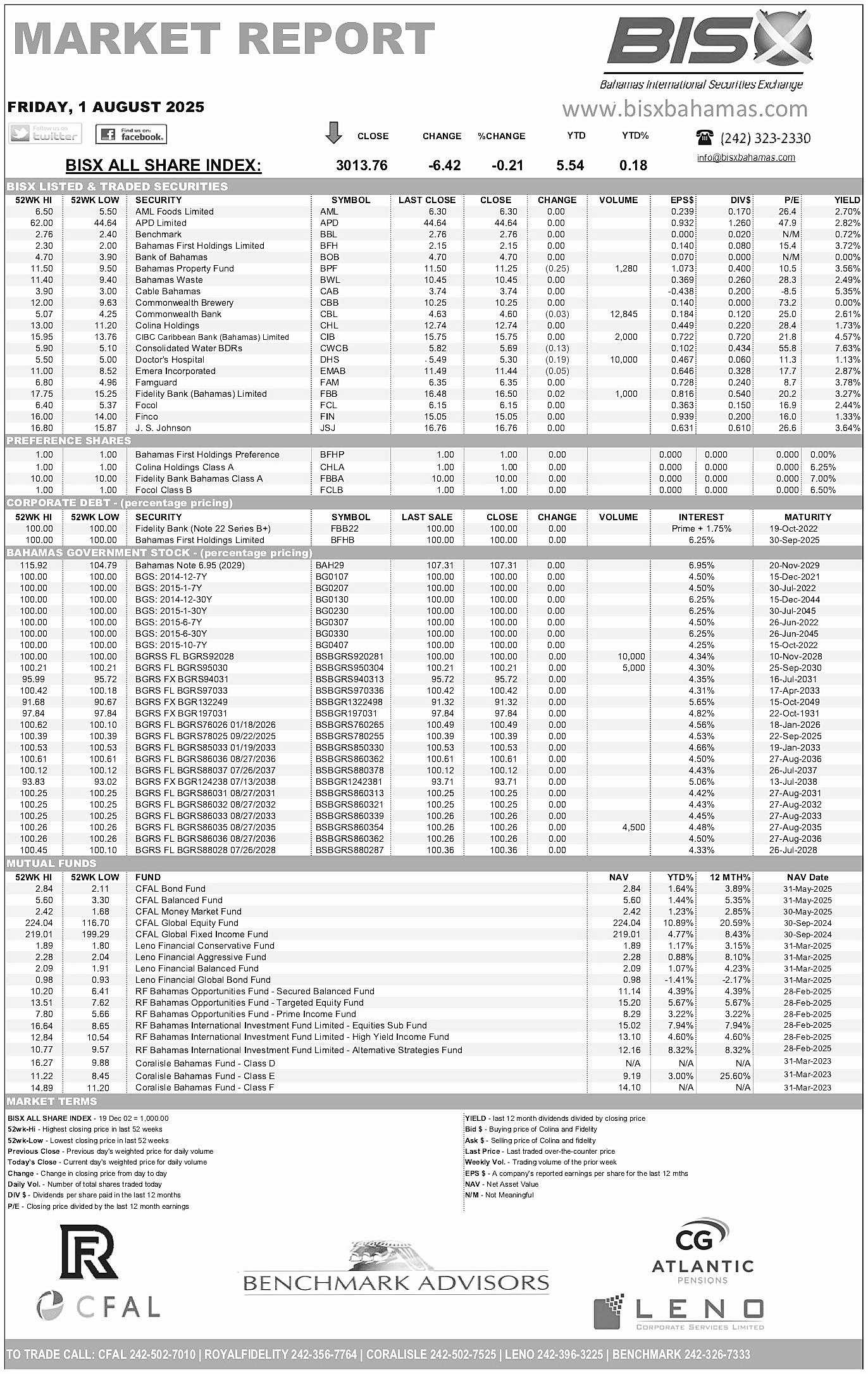
Vietnam automaker VinFast opens factory in India, eyeing growth in Asia
By SIBI ARASU, ANIRUDDHA GHOSAL and RISHI LEKHI Associated Press
VIETNAM'S VinFast
began production at a $500 million electric vehicle plant in southern India's Tamil Nadu state on Monday, part of a planned $2 billion investment in India and a broader expansion across Asia.
The factory in Thoothukudi will initially make 50,000 electric vehicles annually, with room to triple output to 150,000 cars. Given its proximity to a major port in one of India's most industrialized states, VinFast hopes it will be a hub for future exports to the region. It says the factory will create more than 3,000 local jobs.
The Vietnamese company says it scouted 15 locations across six Indian states before choosing Tamil Nadu. It's the center of India's auto industry, with strong manufacturing, skilled workers, good infrastructure, and a reliable supply chain, according to Tamil Nadu's Industries
Minister T.R.B. Raaja.
"This investment will lead to an entirely new industrial cluster in south Tamil Nadu, and more clusters is what India needs to emerge as a global manufacturing hub," he said.
VinFast Asia CEO Pham Sanh Chau said the company has aspirations to export cars across the region and it hopes to turn the new factory into an export hub.
The new factory could also mark the start of an effort to bring other parts of the Vingroup empire to India. The sprawling conglomerate, founded by Vietnam's richest man
Pham Nhat Vuong, began as an instant noodle company in Ukraine in the 1990s and now spans real estate, hospitals, schools and more. Chau said Tamil Nadu Chief Minister M.K. Stalin had invited the company to "invest in a big way" across sectors like green energy, smart cities and tourism, and said that the chief minister had "promised he will do all what is necessary for us to move the whole ecosystem here."
A strategic pivot to Asia
VinFast's foray into India reflects a broader shift in strategy.
The company increasingly is focusing on Asian markets after struggling to gain traction in the U.S. and Europe. It broke ground last year on a $200 million EV assembly plant in Indonesia, where it plans to make 50,000 cars annually. It's also expanding in Thailand and the Philippines.
VinFast sold nearly
presents an enticing mix:
A fast growing economy, rising adoption of EVs, supportive government policies and a rare market where players have yet to completely dominate EV sales.
"It is a market that no automaker in the world can ignore," said Ishan Raghav, managing editor of the Indian car magazine autoX.
A growing EV market in India
EV growth in India has been led by two- and threewheelers that accounted for 86% of the over six million EVs sold last year.
Sales of four-wheel passenger EVs made up only 2.5% of all car sales in India last year, but they have been surging, jumping to more than 110,000 in 2024 from just 1,841 in 2019. The government aims to have EVs account for a third of all passenger vehicle sales by 2030.
"The electric car story has
"This investment will lead to an entirely new industrial cluster in south Tamil Nadu, and more clusters is what India needs to emerge as a global manufacturing hub
T.R.B. Raaja

The shift to EVs is mostly powered by Indian automakers, but VinFast plans to break into the market later this year with its VF6 and VF7 SUV models, which are designed for India.
The company chose the VF7 for its India launch — unlike the models introduced in the U.S., Canada, the EU, or Southeast Asia — to position itself as a premium global brand while keeping the price affordable, added Chau, the VinFast Asia CEO.
Can VinFast succeed where Chinese EVs faltered?
Chinese EV brands that dominate in countries like Thailand and Brazil have found India more challenging.
After border clashes with China in 2020, India blocked companies like BYD from building their own factories. Some then turned to partnerships.
VinFast lacks the geopolitical baggage of its larger Chinese rivals and will also benefit from incentives like lower land prices and tax breaks for building locally in India. That's part of India's policy of discouraging imports with high import duties to help encourage local manufacturing and create more jobs.
The push for onshore manufacturing is a concern also for Tesla, which launched its Model Y in India last month at a price of nearly $80,000, compared to about $44,990 in the U.S without a federal tax credit.
"India's stand is very clear. We do not want to import manufactured cars, even Teslas. Whether it's Tesla or Chinese cars, they are taxed heavily," added Konda.
An uphill battle in a tough market
be
undependable.
Vin-
Fast will need to win over India's cost-sensitive and conservative drivers with a reputation for quality batteries and services while keeping prices low, said Vivek Gulia, co-founder of JMK Research.
"Initially, people will be apprehensive," he said.
VinFast says it plans to set up showrooms and service centers across India, working with local companies for charging and repairs, and cutting costs by recycling batteries and making key parts like powertrains and battery packs in the country.
Chau added that after a customer clinic in September 2024 and input from top engineers in Vietnam, the company upgraded its feature list to better match Indian customer expectations.
97,000 vehicles in 2024. That's triple what it sold the year before, but only about 10% of those sales were outside Vietnam. As it eyes markets in Asia, it hopes the factory in India will be a base for exports to South Asian countries like Nepal and Sri Lanka and also to countries in the Middle East and Africa. India is the world's third-largest car market by number of vehicles sold. It
started (in India) only three or four years ago," said Charith Konda, an energy specialist who looks at India's transport and clean energy sectors for the think tank Institute for Energy Economics and Financial Analysis or IEEFA. New cars that "look great on the road," with better batteries, quick charging and longer driving ranges are driving the sector's rapid growth, he said.
China's SAIC, owner of MG Motor, has joined with India's JSW Group. Their MG Windsor, a five-seater, sold 30,000 units in just nine months, nibbling Tata Motors' 70% EV market share down to about 50%.
Tata was the first local automaker to court massmarket consumers with EVs. Its 2020 launch of the electric Nexon, a small SUV, became India's first major EV car success.

The road ahead remains daunting. India's EV market is crowded with well-entrenched players like Tata Motors and Mahindra, which dominate the more affordable segment, while Hyundai, MG Motors and luxury brands like Mercedes-Benz and Audi compete at high price points.
Indians tend to purchase EVs as second cars used for driving within the city, since the infrastructure for charging elsewhere can
Scale will be key. VinFast has signed agreements to establish 32 dealerships across 27 Indian cities. Hyundai has 1,300 places for Indians to buy their cars. Building a brand in India takes time — Hyundai, for instance, pulled it off over decades, helped by an early endorsement from Bollywood superstar Shah Rukh Khan.
VinFast can succeed if it can get its pricing right and earn the trust of customers, Gulia said, "Then they can actually do really good."

NOTICE IN THE ESTATE of KELLI KERIA ALEXANDRIA INGRAHAM late of West Bay Street, in the Western District of the Island of New Providence, one of the Islands of The Commonwealth of The Bahamas, deceased.
Notice is hereby given that all persons having any claim or demands against the above named Estate are required to send their names, addresses and particulars of the same duly certified in writing to the undersigned on or before the 4th day of August A.D., 2025, and if required, prove such debts or claims, or in default be excluded from any distribution; after the above date the assets will be distributed having regard only to the proved debts or claims of which the Executor shall then have
And Notice is hereby given that all persons indebted to the said Estate are requested to make full settlement on or before the aforementioned date.
MICHAEL A. DEAN & CO., Attorneys for the Executor Alvernia Court, 49A Dowdeswell Street P.O. Box N-3114 Nassau, The Bahamas
BODY AND MIND

WHAT I WISH I KNEW BEFORE I STARTED WEIGHT LOSS JOURNEY
be completed,” she said.
By JEFFARAH GIBSON Tribune Features Writer
Nabila then pivoted into hosting her first class.
jgibson@tribunemedia.net
“Let me tell you, I loved it. Seeing those lightbulb moments when everything clicked for the participants was bliss. It was like sharing a little piece of my self-care world and watching others fall in love with it too,” she said.
‘Nobody
really tells you how personal weight loss gets until
thought
it would
IT is summer, and I should have already lost the weight goal I set at the beginning of the year. But here I am, still trucking through with the extra pounds. So for the people like me who have the good intentions but find themselves stuck in a rut, I get it.
whole lot of fun, a good dose of knowledge, and to leave with a product they can recreate anytime they want, whether it’s for selfcare or the start of something bigger.
She is hoping that the full shift in the brand into offering skincare classes, will soon become the heart of Brown Butta Bae’s mission. These sessions offer more
Nobody really tells you how personal weight loss gets until you are in it. I thought it would just be about cutting back, working out, and watching the scale go down. But I quickly realised it is so much deeper than that.
Some weeks, I felt like I was doing everything right and still gained weight back. That really messed with my head.
And do not even get me started on the emotional part. Giving up comfort foods. Battling old habits. Trying not to feel discouraged every time progress stalled.
I am not at the finish line, and I am not sharing this as some after story. I am still on the journey. But looking back, here are
GOT
you are in it. I
just be about cutting back, working out,
and watching the scale go down. But I quickly realised it is so much deeper than that.’
“I’ve even had a few students purchase kits and go on to launch their own businesses, which makes my heart so full. While I’m all about the creativity and
a few things I wish someone had told me before I got started.
THE SCALE WILL PLAY MIND GAMES WITH YOU
‘I see this new direction as a beautiful way to empower my community, especially those who are curious about handcrafted body care.’
I started at a certain number, one that felt heavy in more ways than one. I did not expect the emotional rollercoaster that would come with it.
Some weeks, I ate clean, moved my body, and still gained a pound or two. No one told me that weight loss does not always go in a straight line.
YOU WILL MOURN FOOD YOU USED TO TURN TO FOR COMFORT
There were meals and snacks that gave me peace when nothing else did.
Hormones, water retention, stress, and sleep can all affect the number. And it does not mean I failed.

it
Letting go of those was not just about calories. It was emotional.
I had no idea how much of my relationship with food was tied to stress, celebration, sadness, and even boredom. Replacing emotional eating with emotional honesty became part of the work.
There were days I woke up ready to conquer the world, and others when I just wanted to crawl back under the covers with a snack. At first, I thought something was wrong with me when my motivation disappeared. But I learned that motivation comes and goes, and that is normal. What really matters is showing up even when I do not feel like it. Some days I walk instead of run. Some days I stretch instead of sweat. But I still show up. Discipline, not motivation, is what keeps the momentum going.
and holistic wellness.
CONSISTENCY MATTERS MORE THAN PERFECTION
I used to think one bad day would erase all the good ones. So I would got frustrated. Now I understand that progress does not disappear because I ate fries. It is what I do next that matters.
Consistency will always take me further than trying to be perfect.
can be both beautiful and accessible. “ Through teaching and connecting, I’m reinforcing that knowledge is power, especially when it comes to what we put on our skin. Whether you’re here to glow up, grow a business, or just try something new, Brown Butta Bae is here to cheer you on, with clean ingredients, real talk, and golden energy every step of the way,” said Nabila.
MOTIVATION WILL NOT ALWAYS BE THERE
Moving forward, Nabila sees a vibrant future for the brand that brings people together through education
THE REAL WIN IS HOW YOU START TO SEE YOURSELF
At first I was chasing a smaller body. Now I am chasing a healthier mindset. Weight loss did not magically fix how I saw myself. I had to learn how to celebrate my body for showing up, even on the days I struggled.
“Brown Butta Bae is evolving into more than a body care brand, it’s becoming a space where beauty, education, and wellness meet,” she said. She is building a community where people can learn, connect, and grow through hands-on experiences, from formulation classes to selfcare rituals.
I am still learning how to love myself in the process, not just when I arrive at a certain number.
“My goal is for everyone who interacts with the brand, develop a self-care practice so rich and intentional,” said Nabila.
THE SNIFFLES? HERE’S WHAT TO KNOW ABOUT SUMMER COLDS, COVID-19 AND MORE
By DEVI SHASTRI AP Health Writer
DOES ALCOHOL AFFECT CHOLESTEROL?
SUMMER heat, out-
RSV was steady this week. But COVID-19 is trending up in many mid-Atlantic, southeast, Southern and West Coast states.
SPOILER alert: The potential benefits of drinking alcohol may be a tad overstated.
door fun... and cold and flu symptoms?
The three may not go together in many people’s minds: partly owing to common myths about germs and partly because many viruses really do have lower activity levels in the summer.
Can you really toast to your health with a daily glass of red wine or a beer?
Eye-grabbing headlines often make the claim that moderate alcohol consumption can lower cholesterol levels and reduce the risk of heart disease.
But it is possible to get the sniffles — or worse — in the summer. Federal data released Friday, for example, shows COVID-19 is trending up in many parts of the country, with emergency department visits up among people of all ages.
But before you pop the top on a bottle to celebrate, a word of caution: The relationship between alcohol and your ticker is not that simple, according to interventional cardiologist Leslie Cho, MD, Cardiovascular Medicine, Cleveland Clinic, Ohio.
Here’s what to know about summer viruses.
How much are colds and flu circulating right now?
“Any statement on the benefits of drinking alcohol has a lot of ‘ifs’ next to it,” says Dr Cho. “You certainly shouldn’t take up alcohol to lower your cholesterol risk.”
The expectation is that COVID-19 will eventually settle into a winter seasonal pattern like other coronaviruses, but the past few years have brought a late summer surge, said Dr. Dean Blumberg, chief of pediatric infectious diseases at University of California Davis Children’s Hospital. Other viruses circulating this time of year include the one that causes “hand, foot and mouth” disease — which has symptoms similar to a cold, plus sores and rashes — and norovirus, sometimes called the stomach flu.
Do viruses spread less in the summer?
is our behavior, experts say. Nice weather means people are opening windows and gathering outside where it’s harder for germs to spread.
advises that adults of legal drinking age should limit alcohol intake to two drinks or fewer in a day for men and one drink or fewer in a
This is not meant as a daily average or target, either. Instead, consider it more of a boundary on any given day when you might choose to have an alcoholic

more boosters than others, he said.
she cautions against thinking you’re boosting your health by tipping back an alcoholic beverage.
For instance, take the claims that alcohol may increase your “good” cholesterol, more officially known as high-density lipoprotein (HDL).
Are more younger kids getting sick with COVID-19? Last week, the CDC noted emergency room visits among children younger than 4 were rising. That makes sense, Blumberg said, because many young kids are getting it for the first time or are unvaccinated.
The number of people seeking medical care for three key illnesses — COVID-19, flu and respiratory syncytial virus, or RSV — is currently low, according to data from the Centers for Disease Control and Prevention. Flu is trending down and
So, grab a glass of … well, let’s go with water to be safe … and let’s talk this over.
Many viruses circulate seasonally, picking up as the weather cools in the fall and winter. So it’s true that fewer people get stuffy noses and coughs in the summer — but cold weather itself does not cause colds. It’s not just about seasonality. The other factor
But respiratory viruses are still around. When the weather gets too hot and everyone heads inside for the air conditioning, doctors say they start seeing more sickness. In places where it gets really hot for a long time, summer can be cold season in its own right.
“I grew up on the East Coast and everybody gets sick in the winter,” said Dr
Much of the alcohol that flows into your system after tipping back a glass finds its way to your liver for a digestive after-party. Alcohol is broken down in your liver and reconstructed as cholesterol and triglycerides. The more you drink, the more your levels of cholesterol and triglycerides rise. As you might imagine, high levels of either type of this waxy fat are not exactly desirable for managing cholesterol or optimal health.
“People who drink a lot of alcohol tend to have very high triglycerides,” says Dr Cho. “That can be a concern because elevated triglyceride levels can increase your risk for
Frank LoVecchio, an emergency room doctor and Arizona State University researcher. “A lot of people get sick in the summer here. Why is that? Because you spend more time indoors.”
diabetes, pancreatitis and stroke.”
Should you get another COVID-19 booster now?
Moderation is key when it comes to alcohol. Consider this advice from the National Institutes of Health (NIH): “Drinking less is better for health than drinking more.”
So, where’s that line? The federal Dietary Guidelines for Americans, 2020-2025
For people who are otherwise healthy, timing is a key consideration to getting any vaccine. You want to get it a few weeks before that big trip or wedding, if that’s the reason for getting boosted, doctors say. But,
It’s important to define what a “drink” means, too, as not all alcohol is the same. (Drink size can certainly vary, too, as anyone who has hoisted up a tall boy understands.) A standard alcoholic drink is typically defined as: 12 ounces of regular beer (5% alcohol), 5 ounces of wine (about 12% alcohol), or 1.5 ounces of a distilled spirit (about 40% alcohol, or 80 proof).
for most people, it may be worth waiting until the fall in anticipation of winter cases of COVID-19 really tick up.
“You want to be fully protected at the time that it’s most important for you,” said Dr Costi Sifri, of the University of Virginia Health System. People at higher risk of complications should always talk with their doctor about what is best for them, Sifri added. Older adults and those with weak immune systems may need
Have there been studies showing the potential benefits of a glass of red wine or a hoppy brew? Yes, acknowledges Dr Cho. But
“There’s some data that says the good cholesterol that’s increased by alcohol is dysfunctional,” notes Dr Cho.
“So, you may be raising your levels of HDL, but you may not be seeing a real benefit.”
Health Secretary Robert F Kennedy Jr said in May that the shots would no longer be recommended for healthy kids, a decision that health experts have said lacks scientific basis. The American Academy of Pediatrics still endorses COVID-19 shots for children older than 6 months.
How else can I lower my risk?
So don’t be lured to a brewery or wine bar with claims that libations double as health tonics. Whatever “benefits” may exist from drinking alcohol are dwarfed by increased risks of: heart disease, stroke, some types of cancer, and liver disease.
Bottom line? “You’re not going to drink your way to better health,” says Dr Cho.
The same things that help prevent colds, flu and COVID any other time of the year work in the summer, doctors say. Spend time outside when you can, wash your hands, wear a mask. And if you’re sick, stay home.
Fetal autopsies could help prevent stillbirths, but too often they are used to blame mothers for pregnancy loss
By JILL LENS Professor of Law, University of Iowa
ABOUT 60 pregnancies per day in the US end in stillbirth.
The best way to find out why a stillbirth occurred is a fetal autopsy –yet these procedures are performed in only one in five of the over 20,000 stillbirths that occur each year. As I explain in my recent book, “Stillbirth and the Law,” the fact that so few fetal autopsies are performed after stillbirths is actually a driver of the disproprotionately high number of stillbirths in the US.
One major exception to the rarity of fetal autopsies is when pregnancy loss ends with criminal arrest. Arrests after pregnancy loss are not new, but according to data compiled by the non-profit group Pregnancy Justice, they have increased since the Supreme Court overturned the federal constitutional right to abortion in 2022.
As a legal scholar who studies pregnancy loss and its potential legal implications, I’m struck by this disparity: Autopsies are rare when the goal is general medical insight about the causes of stillbirth and pregnancy loss more generally, but they are seemingly routine when criminal consequences are possible.
Stillbirth and the inevitability myth
In the US, pregnancy loss before 20 weeks is called miscarriage, and pregnancy loss after 20 weeks is called stillbirth. Miscarriage is much more common, with some studies estimating it occurs in as many as one in four pregnancies. Stillbirth is rarer, but the incidence is still surprisingly high. Currently, about one in 170 births in the US is a stillbirth, a rate higher than in many other high-income countries.
Moreover, that number masks a dramatic racial disparity. Black women in the US face double the risk of stillbirth compared with white women.
Doctors – and, consequently, their patients – widely assume that pregnancy losses are inevitable. That’s relatively accurate for miscarriages, especially those before 12 weeks, which researchers believe are usually caused by chromosomal abnormalities. But it’s not accurate for stillbirths: Research shows that abnormalities account for fewer than eight percent of stillbirths after 28 weeks.
In the US, at least one in four stillbirths are preventable – and that rate is closer to 50 percent for stillbirths at term, meaning after 37 weeks of pregnancy. Yet there’s been little movement toward prevention. According to a 2020 UNICEF report, the US ranks 185th out of 195 countries in reductions to stillbirth rates from 2000-2019.
The US outpaces other highincome countries in maternal mortality – rates that continue to rise
dramatically – and in infant and child mortality. It’s also worth noting that the number of stillborn babies every year in the US consistently exceeds the number of infant deaths from all causes.
The rarity of fetal autopsies
There is no one solution to reducing the US’s stillbirth rate, but gathering data about its causes is a necessary step. A fetal autopsy is widely considered the gold standard for determining the cause of death after stillbirth. The autopsy procedure is extensive, with X-rays, external evaluations of the baby and examinations of internal organs and tissue sampling.
Not only are fetal autopsies extremely rare, but the data from fetal autopsies that do occur is likely not representative. Women with higher levels of education are more likely to get a fetal autopsy after stillbirth. Women with lesser income, however, have double the risk of stillbirth.
One barrier is cost. Many hospitals will not cover the costs of a fetal autopsy. Medicaid does not cover the exam either, and neither do many private insurance companies. Outof-pocket costs range from $1,500 to $5,000. Stillbirth is surprisingly expensive, and many families understandably choose to use their funds to cover other costs.
The way that doctors bring up the subject of fetal autopsy can also influence whether parents decide on one. Research suggests that parents often do not receive compassionate counseling on this issue. Some parents reported feeling that providers actively discourage them from having one. Providers often lack knowledge about the benefits of fetal autopsy and of the process itself. Doctors’ reactions to stillbirth as a rare, freak event dissuades parents from exploring the cause of their child’s stillbirth and conveys that nothing would be gained from a fetal autopsy.
Finally, there simply aren’t enough qualified pathologists who have expertise in stillbirth evaluation in the US. Fetal autopsies are complex. Performing them requires synthesising knowledge about birth defects, genetic syndromes, maternal effects, fetal development and more. Pathologists must evaluate the placenta and the umbilical cord and factor in maternal health. According to a 2019 report, only 268 out of more than 21,000 pathologists in the US had specialised training in pediatric pathology. And even those pathologists are not guaranteed to have expertise in evaluating fetal or neonatal deaths.
Fetal autopsies’ misuse as criminal evidence
In my view, the rarity of fetal autopsies feeds a sort of vicious cycle. If the cause of a stillbirth is unknown, it opens the doors to suspicion that the pregnant person caused
their pregnancy loss.
Overwhelmingly, the women who have been arrested after their pregnancy loss have been from mar ginalized communities, suggesting that bias also plays a strong role in these arrests. And in these cases, fetal autopsies are common. For instance, authorities conducted one on the fetus of Selena ChandlerScott in April 2025, when she was arrested after having a miscarriage at 19 weeks. A pathologist concluded from the autopsy that ChandlerScott did not cause the miscarriage.
More often though, autopsies in such cases are used to conclude that the pregnant person was at fault. There’s every reason, however, to question those conclusions. Fetal autopsies help identify underlying causes of pregnancy loss only when performed by pathologists specifi cally qualified to perform them. And in many high-profile criminal cases, it’s clear that pathologists lacked the required expertise to assess fetal deaths.
Consider, for exam ple, Rennie Gibbs, who experienced a stillbirth in Mis sissippi when she was 16. Her baby girl was born with the umbilical cord wrapped around her neck, yet the de facto state medical exam iner at the time – who was not a certified patholo gist and therefore clearly lacked the needed specialisa tion – concluded she had died due to Gibbs’ cocaine use. Chelsea Becker of California had at least three infections that increase the risk of stillbirth, yet the pathol ogist, who also lacked the needed specialisation, concluded the baby died due to Becker’s meth amphetamine use – and later admitted he had never even looked at her medical history.
But it’s hard to rebut these conclusions without building a foundation of research on why still births are happening. Fetal autopsies per formed by qualified pathologists to system atically assess the causes of death are a key compo nent of that research – which, I believe, will both help prevent stillbirths and decrease the incli nation to blame people who experience pregnancy loss.
• Originally published on www.theconversation.com.

CAUSES OF VERTIGO AND THE ROLE OF PHYSIOTHERAPY
VERTIGO is a sensation of spinning or dizziness, often described as feeling like the room is moving around you. It can be a debilitating condition that significantly impacts a person’s quality of life. Understanding the causes of vertigo and the role of physiotherapy in its management is crucial for effective treatment.
Causes of Vertigo Benign Paroxysmal Positional Vertigo (BPPV): This is the most common cause of vertigo. BPPV occurs when small calcium crystals (otoconia) in the inner ear become dislodged and move into the semicircular canals. This causes a false sense of movement when the head position changes.
Vestibular Neuritis or Labyrinthitis: These conditions involve inflammation of the vestibular nerve or labyrinth in the inner ear, often due to viral infections. They can cause sudden, severe vertigo that may last for several days.
Meniere’s disease: This inner ear disorder is characterised by episodes of vertigo, fluctuating hearing loss, tinnitus, and
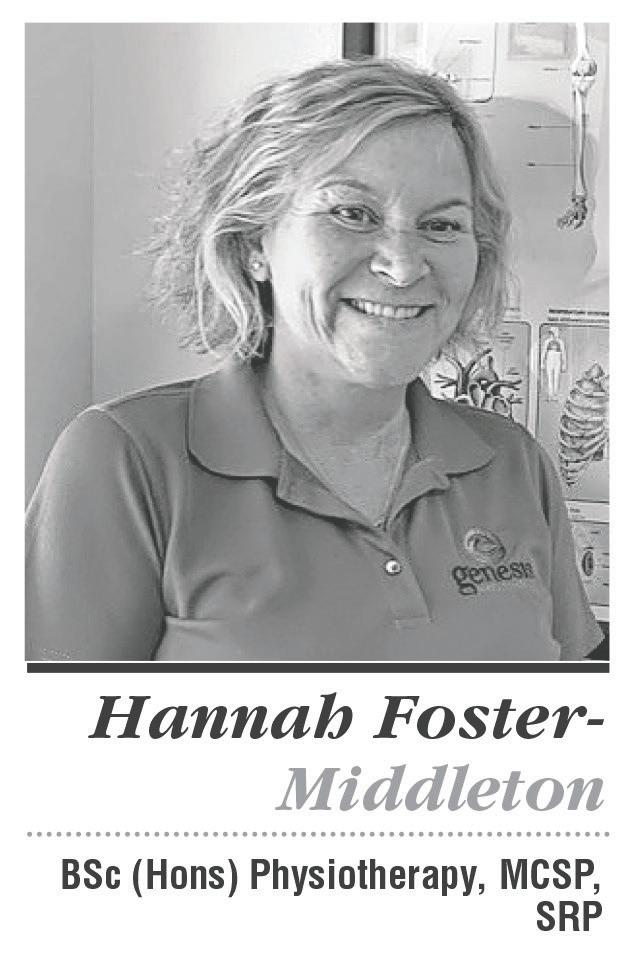
a feeling of fullness in the ear. The exact cause is unknown, but it’s thought to be related to fluid buildup in the inner ear.
Vestibular Migraine: Some people experience vertigo as a symptom of migraine headaches, even without the typical headache pain.
Acoustic Neuroma: This is a benign tumor that grows on the vestibular nerve, which connects the inner ear to the brain. It can
cause gradual hearing loss, tinnitus, and balance problems.
Cervicogenic dizziness: This type of dizziness is related to neck problems, such as cervical spondylosis or whiplash injuries.
Central causes: Conditions affecting the brain, such as stroke, multiple sclerosis, or brain tumors, can cause vertigo.
Perilymph Fistula: This occurs when there’s an abnormal connection between the middle and inner ear, allowing fluid to leak from the inner ear.
Mal de Debarquement Syndrome: This rare condition causes a persistent sensation of rocking or swaying, typically after sea travel.
Medication side effects: Some medications can cause dizziness or vertigo as a side effect. Anxiety disorders: Severe anxiety can sometimes manifest as a sensation of dizziness or vertigo.
The role of physiotherapy in managing vertigo Physiotherapy plays a crucial role in the assessment and treatment of many types of vertigo, particularly those of
vestibular origin. The primary goals of physiotherapy for vertigo are to reduce symptoms, improve balance and stability, and enhance overall function. Here’s how physiotherapists approach vertigo management:
Comprehensive assessment:
• Detailed history taking to understand the nature and triggers of vertigo
• Physical examination including balance and gait assessment
• Specific vestibular tests such as the Dix-Hallpike test for BPPV
• Oculomotor examination to assess eye movements
Vestibular Rehabilitation Therapy (VRT): This is a specialised form of therapy aimed at reducing vertigo and dizziness. It includes:
• Gaze stabilisation exercises to improve visual focus during head movements
• Habituation exercises to reduce sensitivity to certain movements
• Balance training to improve stability and reduce fall risk
• Adaptation exercises to help the brain compensate for vestibular deficits
Canalith repositioning procedures: For BPPV, physiotherapists use specific manoeuvers (e.g., Epley manoeuver, Semont manoeuver) to guide the displaced crystals back to their proper location in the inner ear.
Balance retraining:
• Static and dynamic balance exercises
• Use of balance boards or other equipment to challenge balance systems
• Functional balance activities that mimic daily tasks
Gait training: Improving walking patterns and confidence during mobility.
Manual therapy: For cervicogenic dizziness, manual techniques to the neck like decompression therapy and spinal manipulation can help alleviate symptoms.
Education:
• Explaining the cause of vertigo and the rehabilitation process
• Teaching self-management strategies
• Providing information on fall prevention.

MAKE THE MOST OF YOUR BRAIDS THIS SUMMER
Hair - from page 15
even mixed textures to traditional box braids for a modern take.
“Think chocolate brown with caramel highlights or black braids with honey blonde accents. These styles pop against sun-kissed skin and tropical backdrops. Unisex and stylish, Pop Smoke braids are perfect for active vacations think hiking, ATV riding, or zip-lining. They are clean, durable, and require minimal upkeep while still being fashion-forward,” she told Tribune Woman.
While braids are a protective style, your scalp still needs attention especially under the blazing sun. Ms Mackey recommends traveling with a hydrating scalp mist, edge control, and a satin scarf or bonnet to preserve your look for the entire trip. Preparation before your install and care during your vacation are just as important as the style itself.
When it comes to choosing your vacation hairstyle, braids always come out on top. They are versatile, longlasting, and look amazing dressed up or down. Whether you are relaxing or adventuring, braids give you the freedom to focus on the moment and not your hair.
‘Lightweight, painless, and perfect for any destination, knotless braids have become the new go-to. They do not tug on your scalp and offer a more natural look ideal for long trips and versatile styling.’
HOW FDA PANELISTS CASTING DOUBT ON ANTIDEPRESSANT USE DURING PREGNANCY COULD LEAD TO DEVASTATING OUTCOMES FOR MOTHERS
By NICOLE AMOYAL Pensak Researcher of Caregiver Stress Management and Clinical Psychologist, University of Colorado Anschutz
AT A meeting held by the Food and Drug Administration on July 21, a panel convened by the agency cast doubt on the safety of antidepressant medications called selective serotonin reuptake inhibitors, or SSRIs, in pregnancy.
Panel members discussed adding a so-called black box warning to the drugs – which the agency uses to indicate severe or life-threatening side effects – about the risk they pose to developing fetuses. Some of the panelists who attended had a history of expressing deep skepticism on antidepressants.
SSRIs include drugs like Prozac and Zoloft and are the most commonly used medicines for treating clinical depression. They are considered the first-line medications for treating depression in pregnancy, with approximately five percent to six percent of North American women taking an SSRI during pregnancy.
We are a psychologist certified in perinatal mental health and a reproductive psychiatrist and neuroscientist who studies female hormones and drug treatments for depression. We are concerned that many claims made at the meeting about the dangers of those drugs contradict decades of research evidence showing that antidepressant use during pregnancy is low risk when compared with the dangers of mental illness.
As clinicians, we have front-row seats to the maternal mental health crisis in the US. Mental illness, including suicide and overdose, is the leading cause of maternal deaths.
Like all drugs, SSRIs carry both risks and benefits. But research shows that the benefits to pregnant patients outweigh the
risks of the SSRIs, as well as the risks of untreated depression.
The panel did not address the safety of SSRIs following delivery, but numerous studies show that taking SSRI antidepressants while breastfeeding is low risk, usually producing low to undetectable drug levels in infants.
THE BIOLOGY OF MATERNAL BRAIN HEALTH
Pregnancy and the months following childbirth are characterized by so many emotional, psychological and physical changes that the transition to motherhood has a specific name: matrescence. During matrescence, the brain changes rapidly as it prepares to efficiently take care of a baby.
The capacity for change within the brain is known as “plasticity”. Enhanced plasticity during pregnancy and the postpartum period is what allows the maternal brain to become better at attuning to and carrying out the tasks of motherhood.
For example, research indicates that during this period, the brain is primed to respond to baby-related stimuli and improve a mother’s ability to regulate her emotions. These brain shifts also act as a mental buffer against aging and stress in the long term. On the flip side, these rapid brain changes, fueled by hormonal shifts, can make people especially vulnerable to the risk of mental illness during and after pregnancy. For women who have a prior history of depression, the risk is even greater.
Clinical depression interferes with brain plasticity, such that the brain becomes “stuck” in patterns of negative thoughts, emotions and behaviours.
This leads to impairment in brain functions that are essential to motherhood. New mothers with depression have decreased brain activity in regions responsible for motivation,

regulation of emotion and problem-solving. They are often withdrawn or overprotective of their infants, and they struggle with the relentless effort needed for tasks that arise with child-rearing like soothing, feeding, stimulating, planning and anticipating the child’s needs.
Research shows that SSRIs work by promoting brain plasticity. This in turn allows individuals to perceive the world more positively, increases the experience of gratification as a mother and facilitates cognitive flexibility for problem-solving.
ASSESSING THE RISKS OF SSRIS IN PREGNANCY
Prescription drugs like SSRIs are just one aspect of treating pregnant women struggling with mental illness.
Evidence-based psychotherapy, such as cognitive behavioral therapy, can also induce adaptive brain changes. But women with severe symptoms often require medication before they can reap the benefits of psychotherapy, and finding properly trained, accessible and affordable psychotherapists can be challenging. So sometimes, SSRIs may be the most appropriate treatment option available. Multiple studies have
examined the effects of SSRIs on the developing fetus. Some data does show a link between these drugs and preterm birth, as well as low birth weight.
However, depression during pregnancy is also linked to these effects, making it difficult to disentangle what’s due to the drug and what’s due to the illness.
SSRIs are linked to a condition called neonatal adaption syndrome, in which infants are born jittery, irritable and with abnormal muscle tone.
About one-third of infants born to mothers taking SSRIs experience it. However, research shows that it usually resolves within two weeks and does not have long-term health implications.
The FDA-convened panel heavily focused on potential risks of SSRI usage, with several individuals incorrectly asserting that these drugs cause autism in exposed youth, as well as birth defects. At least one panelist discussed clinical depression as a “normal” part of the “emotional” experience during pregnancy and following birth.
This perpetuates a long history of of women being dismissed, ignored and not believed in medical care. It also discounts the rigorous
assessment and criteria that medical professionals use to diagnose reproductive mental health disorders.
A summary of the pivotal studies on SSRIs in pregnancy by the Massachusetts General Hospital Center for Women’s Health discusses how research has shown SSRIs to not be associated with miscarriage, birth defects or developmental conditions in children, including autism spectrum disorder.
THE RISKS OF UNTREATED MENTAL ILLNESS
Untreated clinical depression in pregnancy has several known risks. As noted above, babies born to mothers with clinical depression have a higher risk of preterm birth and low birth weight. They are also more likely to require neonatal intensive care and are at greater risk of behavioral problems and impaired cognition in childhood.
Women who are clinically depressed have an increased risk of developing preeclampsia – a condition involving high blood pressure that, if not identified and treated quickly, can be fatal to both mother and fetus. Just as concerning is the heightened risk of suicide in depression. Suicide accounts for about eight percent of deaths in pregnancy and shortly after birth.
Compared with these very serious risks, the risks of using SSRIs in pregnancy turn out to be minimal. While women used to be encouraged to stop taking SSRIs during pregnancy to avoid some of these risks, this is no longer recommended, as it exposes women to a high chance of depression relapse. The American College of Obstetricians and Gynecologists recommends that all perinatal mental health treatments, including SSRIs, continue to be available.
Many women are already reluctant to take antidepressants during pregnancy,
and given the choice, they tend to avoid it.
From a psychological standpoint, exposing their fetus to the side effects of antidepressant medications is one of many common reasons for women in the US to feel maternal guilt or shame. However, the available data suggests such guilt is not warranted.
Taken together, the best thing one can do for pregnant women and their babies is not to avoid prescribing these drugs when needed, but to take every measure possible to promote health: optimal prenatal care, and the combination of medications with psychotherapy, as well as other evidence-based treatments such as bright light therapy, exercise and adequate nutrition.
The panel failed to address the latest neuroscience behind depression, how antidepressants work in the brain and the biological rationale for why doctors use them in the first place. Patients deserve education on what’s happening in their brain, and how a drug like an SSRI might work to help. Depression during pregnancy and in the months following birth is a serious barrier to brain health for mothers. SSRIs are one way of promoting healthy brain changes so that mothers can thrive both short- and long-term.
Should the FDA, as a result of this recent panel, decide to place a black-box warning on antidepressants in pregnancy, researchers like us already know from history what will happen. In 2004, the FDA placed a warning on antidepressants describing potential suicidal ideation and behavior in young people. In the following years, antidepressant-prescribing decreased, while the consequences of mental illness increased. And it’s easy to imagine a similar pattern in pregnant women.
The best vacation braid hairstyles to rock this summer
By JEFFARAH GIBSON Tribune Features Writer jgibson@tribunemedia.net
WHEN it comes to planning the perfect vacation, most women have their checklist: flights, outfits, skincare essentials… and, of course, braids.
For veteran hair braider
Anthonique Mackey, braids are not just a style choice they are a travel essential.
“Your vacation braid style should match your destination vibe,” said Ms Mackey, who has braided hundreds of clients for getaways ranging from group trips to solo retreats.
“If you are going somewhere humid or you will be spending time in the water, lightweight and quick-drying styles are the way to go. Knotless braids, feed-ins, or cornrow styles are my top recommendations.”
She adds:
“Braids should look good, yes - but they also need to protect your hair while you are in the
‘Braids should look good, yes - but they also need to protect your hair while you are in the sun, salt water, or pool.’
sun, salt water, or pool. You want a style that can handle all of that without needing constant maintenance.”
Whether you are headed to the islands, a big city escape, or a cozy mountain hideaway, one thing is for sure - vacation is better with braids. Lightweight, painless, and perfect for any destination, knotless braids have become the new go-to. They do not tug on your scalp and offer a more natural look ideal for long trips and versatile styling. You can throw them in a top bun for beach day, or wear them long and flowing for a sunset dinner. With their loose curls
and relaxed finish, goddess braids give effortless island girl energy. Perfect for tropical vacations or boho-inspired getaways, they blend protective styling with a hint of flirt. Add shells, cuffs, or gold thread to turn heads everywhere from the airport to the resort.
Still holding strong years after Beyoncé’s visual album dropped, lemonade braids offer a sleek, sideswept style that frames the face beautifully. They are bold, edgy, and radiate main character energy.
Known for their tribal roots and signature centre part, Fulani braids combine thin-to-medium cornrows with beads and accessories. The style is ideal for Afrocentric retreats or culture-rich destinations and makes a statement in every vacation photo.
Ms Mackey said you can also add curls, colour, or
HAIR - SEE PAGE 14


























































































































































































Labubu is the new must-have
By CARA HUNT Tribune Features Writer cbrennen@tribunemedia.net
THESE days it is not about what designer bag you carry, its all about the charm you add to it.
The bag charm craze has been blowing up on social media lately as fashionistas the world over share just how they bling out their bags with cute little accents designed to show case their personality.
Leading the trend are the Labubu (pro nounced Luh Boo Boo) charms which have become a fashion status symbol and the must have fashion accessories of the year.
These little doll charms were first spotted in 2015, the creation of Hong Kong artist Kasing Lung. They were based on the characters of his book The Monster Trilogy. The book fea tured a playful tribe of female elves called Labubus.
Labubu dolls are certainly beauty in the eye of the beholder. They look like scary but also yet adorable monsters with large teeth, sharp ears and mischievous expressions.
So just how did these little monsters become the must have item of the year?
It is all thanks to a brilliant marketing strategy by Chinese retailer Pop Mart whose lim ited release and mystery boxing inspire fans to keep buying and buying and reselling and trading cre ating a whole frenzy.
The dolls come in mystery boxes so you can never be sure what you get - great for unboxing videos, not so great for your pock etbook. And you can also dress them out in the cutest little outfits.
This means that there is a huge interest for the ‘must-have Labubus,” which means that the resale price value can be huge.

While the bag charms often retail for around $30, some of the more popular, desirable ones can be resold for hundreds and hun dreds. And woman have reported that their charms have been stolen right off their bags.

And if you would prefer a larger furry friend, have no fear, the brand has that as well. In fact, a lifesize Labubu recently sold at an auction hosted by Yongle in China for more than $170,000. There were more than 1,000 bidders.
The brand’s appeal is also due to designer influence. Over the years, celebrities such as Dua Lipa, Rihanna, and Lisa from the K-pop group BLACKPINK, have sported the brand. Of course, imitation is the sincerest form of flattery and there are fake Labubus on the market - they are often called Lafufus.
“Experts” say the way to tell the difference is that fakes feel lighter and flimsier. Real ones also have nine teeth and a stamp of authenticity at the bottom of the feet.
So just what do Bahamian fashionitas think about the trend?
“Its stupid,” says Marlena frankly. “It’s one of those things people waste money on, just so they can say they cool. Those things are scary - why would I want that hanging on my bag? I
something simple like my initial or a flower charm.
Anna agrees: “I get that people may think they so ugly they cute and I can see it for a little girl, but these grown women wearing them, no. If anything I would buy my daughter and my nieces one if they asked, but it’s not my style.
However, Tiny and Amanda love them.
Tiny says: “I don’t have one and I would never pay those ridiculous resale prices, but if I went away and was in a store that had one I would grab one or two.”
Amanda agreed, “I wouldn’t mind one, I feel like it would be a fun accessories for like a trip or a fun outing. But I would want to be able to pick the one I get, I don’t like that mystery boxing idea.”



